CHARISM

A COMMUNITY OF FAITH
WINTER/SPRING 2018 THE FRANCES XAVIER WARDE SCHOOL
MAGAZINE
The Frances Xavier Warde School is an independent, Catholic elementary school in downtown Chicago that provides an academically excellent, values-oriented education to students of all ethnic, religious, cultural, and socioeconomic backgrounds in a child-centered urban environment.
At FXW, we are guided by our four Charisms. We partner with our families to nurture faith development for our Catholic students and engage all of our students to learn about and respect other faith traditions. FXW focuses on educating the whole child, including social-emotional development, a comprehensive arts program, and a rigorous curriculum aimed at developing critical thinkers who are prepared to live as global citizens in the world. As a keystone of our diverse community, we provide need-based scholarships to children throughout the Chicago area.
Our Charisms serve as a roadmap for shaping and teaching our children. We create an individualized educational experience that recognizes each child as unique. Our Charisms are the gifts that FXW gives to its families and to its students.
Charism Defined: Any good gift that flows from God’s love to humans.
The FXW Charisms
DIVERSITY AND INCLUSION
A Community that is purposefully diverse and intentionally inclusive
FAITH
A Community of faith that welcomes and embraces all faith traditions
ACADEMICS
A Community that is preparing thinkers and leaders in an academically enriched environment
SERVICE
A Community that is motivated by faith to serve others
Board of Trustees
The Frances Xavier Warde School is governed by our Board of Trustees. As an independent school, we maintain our Catholic identity with oversight from The Association of Christian Faithful to ensure our commitment to spirituality
2017-2018
David Andrews
Albert Boumenot
Mary Pat Burns
Matthew Carolan
Kelly McCloskey Cherf
Nora Daley
Mary Dempsey
Brandon Dobell
Fr. Tom Hurley
Michael Kasper
Michael Kennedy, Head of School
Rose Loftus
Deborah Marchese
Greg Mooney
Dr. Guriqbal Nandra
Gary Rozier
Fr. Gregory Sakowicz
Ann Marie Sink
Mark Skender, Chair
Enrique Suarez
Susan Thomas
Credits
Head of School: Michael Kennedy
Editor: Christopher Portman
Design: Communiqué Graphic Design
Photographic contributions:
Danielle Kelly and Lindsay Mosshammer
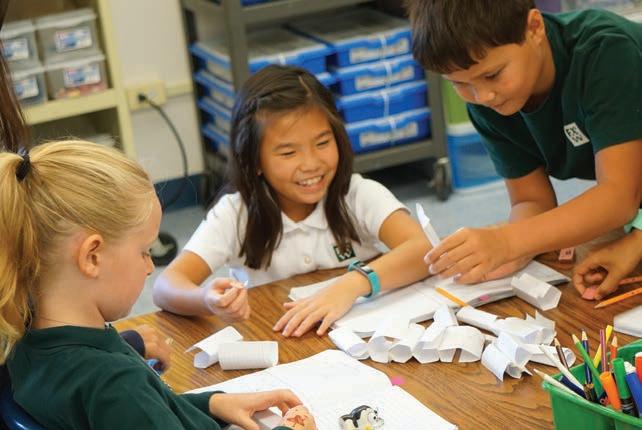
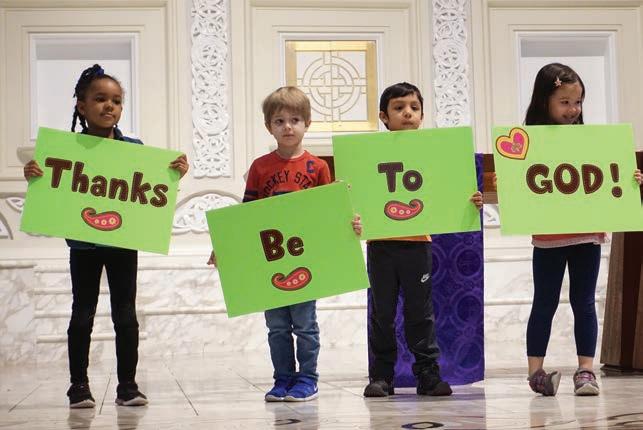
CONTENTS WINTER/SPRING 2018 NEWS 05 Letter from the Head of School 27 Around Campus 30 Alumni News & Notes 34 Gala 2018 FEATURES 26 Forming Souls 10 Standing at the Intersection of Inheritance and Discovery 14 Moonbeams and Shooting Stars: A History 18 Full Circle/We Rise By Lifting Others 21 Are You Learning the Bible? 24 Diversity in Faith: A Parental Perspective 3
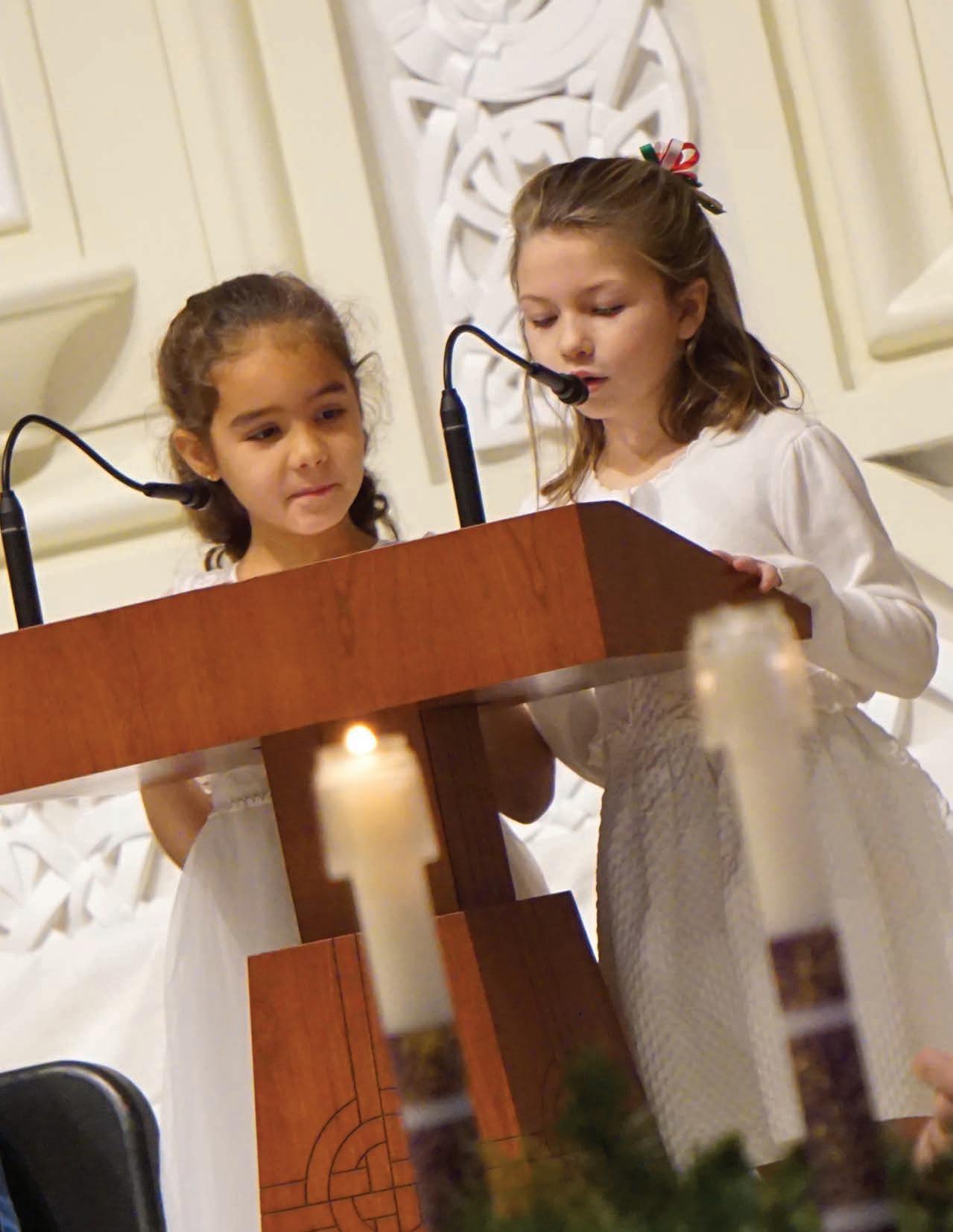
4
Letter from the Head of School
The Frances Xavier Warde School is a community of faith that welcomes and embraces all faith traditions. This is one of our four Charisms and as such is a central pillar of our identity. But what exactly does this foundational principle mean? More importantly, why does it matter?
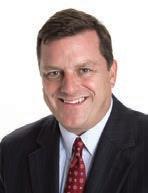
We could answer the question about meaning in a fairly straightforward manner: we are a Catholic School, proud of our Catholic heritage and committed to Catholic teachings. We also welcome and learn next to and from students and families of all faith traditions. This answer becomes more interesting when we recognize that these ideas are not separate or divisible; we are not a Catholic School that also happens to be a multi-faith school. Rather, it is a singular idea and we are one united school. We embrace all faith traditions precisely because that is our understanding of what it means to be Catholic, with both a capital and a lowercase “c.”
Why is any of that important? I believe that there are tangible and spiritual benefits to leading a life of faith. I believe that being exposed to many different faith traditions not only better prepares us to live in our diverse
world but also helps to refine and clarify our own beliefs. I believe our faith helps to align our priorities and motivates us to serve others, and that understanding the role of faith is an integral part of educating the whole child.
But my answers and beliefs are by no means definitive. Each year we pay special attention to one of our founding principles and this year, as part of our focus on our Charism of Faith, it is most appropriate to use this forum of Charism Magazine to hear a variety of voices discuss how this central tenet of our identity can be, should be, and is lived out in the life of our School. We hear from our pastors and from some of our parents, from an alumna and from a leading voice on religious pluralism. We also take a close look at our religious education curriculum and our professional development efforts in this area, and we are privileged to witness a very touching testimonial to the power of faith.
None of us has all the answers. But together, we can come much closer to the truth in all of its messy, multi-faceted glory. What follows, then, is a communal effort to grasp more fully the hows and whys of our Charism of Faith.
Please enjoy reading these reflections, as well as news from around campus and updates from many of our amazing alumni.
Sincerely,
 Michael Kennedy Head of School
Michael Kennedy Head of School
5
FAITH
Forming Souls
A Discussion Between Fr. Tom Hurley and Fr. Greg Sakowicz
Father Tom Hurley, the pastor of Old St. Patrick’s Church, and Father Greg Sakowicz, the rector of Holy Name Cathedral, have known each other for many years, beginning with Fr. Hurley’s first day at the seminary, where Fr. Sakowicz was a faculty member. The Frances Xavier Warde School is truly blessed to have such thoughtful, dynamic, and charismatic spiritual leaders, and their friendship strengthens the close bonds between our two campuses.
Recently, the two priests sat down to discuss our Charism of Faith and, in particular, the how and why behind our mission of being a Catholic school that is open to all faiths.
The Importance of Faith-based Education
Father Tom Hurley (FTH): At The Frances Xavier Warde School, we’re not just forming minds and putting knowledge into students’ heads. But rather, what we are doing is putting a certain sense of meaning and purpose into their souls. We are in the business of forming souls.
Father Greg Sakowicz (FGS): Absolutely. We have a tremendous academic program, but that is only part of who we are. There is an integration of education with faith on multi-faceted levels, including an amazing service outreach. We live in a world that is very tough. The challenge for all of us is to somehow connect the mystery of God with the mystery of our lives.
FTH: Another challenge is that there are many people today who feel that faith does not make a difference, or who are negative toward institutional religion; not just Catholicism, but any institution of faith. People have enshrined other values—success, upward mobility, what you wear, where you live, what your fancy title is, ensuring that your kid goes to the
That’s such a huge part of The Frances Xavier Warde School. At the end of the day, how did you treat one another? What values are we passing on to our children? As Tom said, it’s not about the paycheck, it’s not the title or the position—what is really important is living one’s life for others.
What it Means to be a Catholic School
FGS: The word “catholic” means “universal,” and I find that to be so important. We are a Catholic school that truly welcomes everyone with open arms. All are equal, all are welcome.
FTH: Yes, we are definitely a Catholic school in the spirit of the Second Vatican Council, which was called an ecumenical council. Vatican II taught us that we need to be more aware that we live in this world of great richness, the richness of culture and the richness of religious traditions, not only Christianity but all traditions. The fact that The Frances Xavier Warde School reflects that, protects that, lifts that up, and reverences that is really quite significant.
"The challenge for all of us is to somehow connect the mystery of God with the mystery of our lives."
“best” school. If that’s all we’re doing, then we’ve missed the boat. Our community, our school community, our school of faith is one that says no, there are more essential values, foundational values: that is, the formation of the human spirit. That’s what we are about.
FGS: I received a beautiful Christmas card several years ago that said, “People don’t care how much you know, but they want to know how much you care.” It’s a wonderful line.
FGS: I am proud that we are a Catholic school, and I’m very, very proud of our tremendous diversity. To make this work, we need to listen to each other and respect each other, so that we can celebrate together the presence of God in our lives. Not so much by what we say, but more importantly by what we do, especially reaching out to the poor and the homeless, those that have less.
6
Fr. Greg Sakowicz (left) and Fr. Tom Hurley at a School prayer service.
FAITH
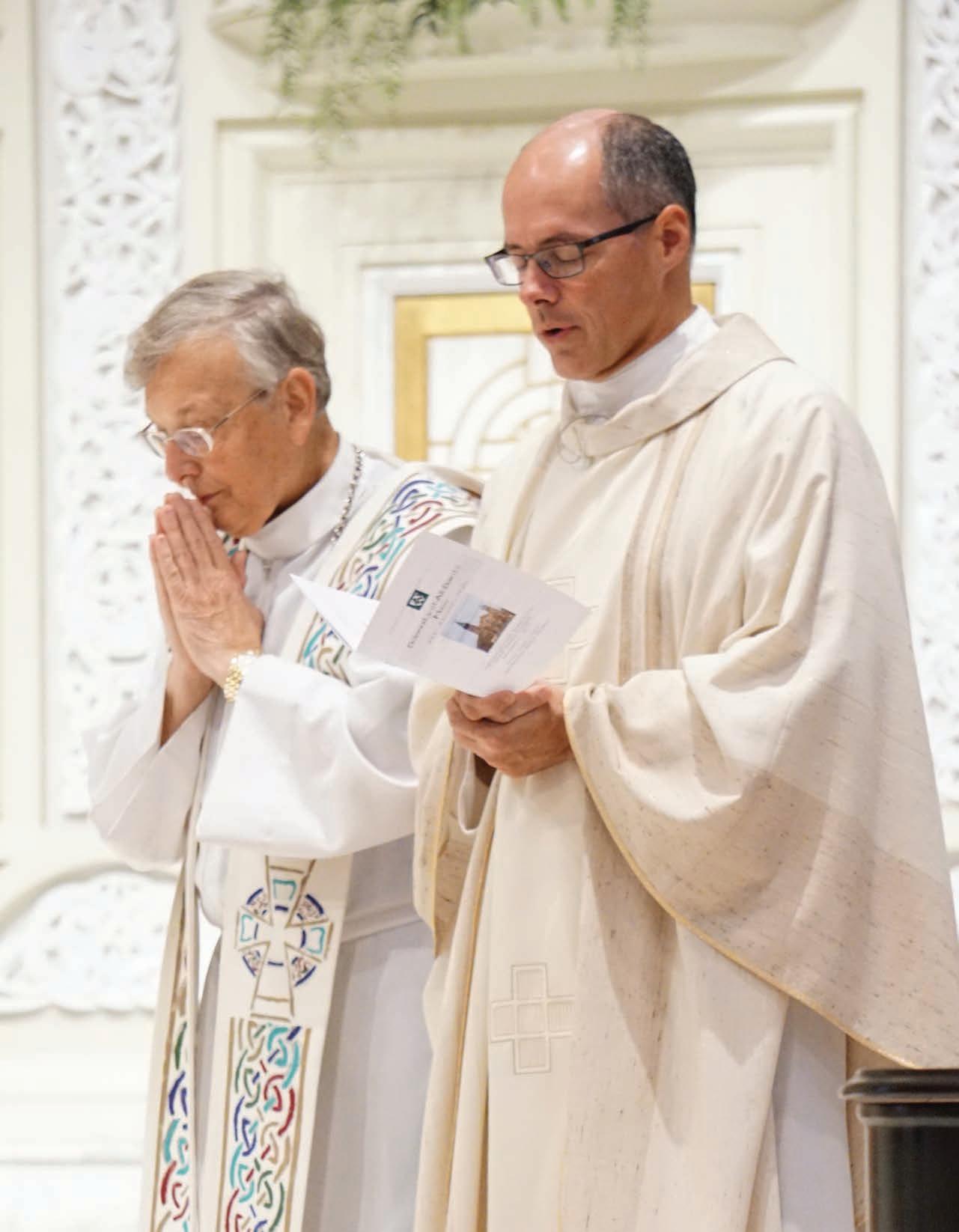
7
FAITH
FTH: To put all of these ideals into action, we have to be faithful to our true north—and our true north is that we are a Catholic, interfaith, ecumenical school, and that we are here to form the souls and spirits of the next generation. That is really, really important. We cannot just be a nice little academy for smart kids in downtown Chicago. We’ve got to be a school that is true to our mission in forming disciples in the Christian tradition, while also forming good Jews and good Muslims and good Buddhists and good people.
FGS: I’m reminded of that wonderful line that asks, “If we were arrested for being Christian, would there be enough evidence to convict us?” It’s a very thought-provoking question, and something that we must keep in the forefront of all that we do.
The Benefits of Our Diverse Community
FTH: The Jewish kid who sits next to the Muslim kid who sits next to the Catholic kid— they are all aware of and open to the fact that this is what the world is supposed to be. Our world is supposed to be a place of holy communion. The fact that our students get to experience that, live that, create that— it is not just something that is imposed upon them— to the contrary, it is something that they create. Our children create a really beautiful community. I see that, I sense it, I hear it: we are a community of great respect.
FGS: I totally agree. As I said before, it’s all about listening to each other and respecting each other; when we do that, we can then learn from each other. It’s not about forming camps. We are all under one umbrella. The children who are Catholic are learning about Catholic tradition and history, but they’re also learning about the other traditions, and the children who are not Catholic learn about their own and other traditions and history, but there is also an openness and an opportunity to learn about Catholicism. So it’s a two-way street, and we all benefit from that.
FTH: Last fall, I presided at the prayer service for all of the OSP students. We were celebrating the harvest and the legacy of Mother Frances Xavier Warde, and I was wearing a stole that the School gave to me, and on the stole are many different symbols of various faith traditions. After the service, I was standing at the back of the church and a couple of our little friends were coming out, and they pointed to the different symbols and said what each represented. For them there was no shock; it just made perfect sense that some Catholic priest was wearing a stole with symbols of other traditions on it. I would hope that something that simple sends a powerful message to these young, impressionable, forming minds and forming souls that this is okay, this is the way it should be.
FGS: It’s a benefit for all of us too. When I walk into the classroom, the kids energize me; they truly lift my spirits. I can walk in with so much on my mind, twenty things to do, meetings or hospital visits, and it all just melts away. Looking at all those faces, smiling and waving and walking quickly through the halls, it brings back my grammar school days. But the thing that really strikes me is that we are all one. That’s what we’re all about—there’s a oneness within our diversity. There’s a beautiful line from scripture, “Love your neighbor as yourself;” I once heard that translated as “Love your neighbor who is like yourself.” That says it all—we’re all in this together.
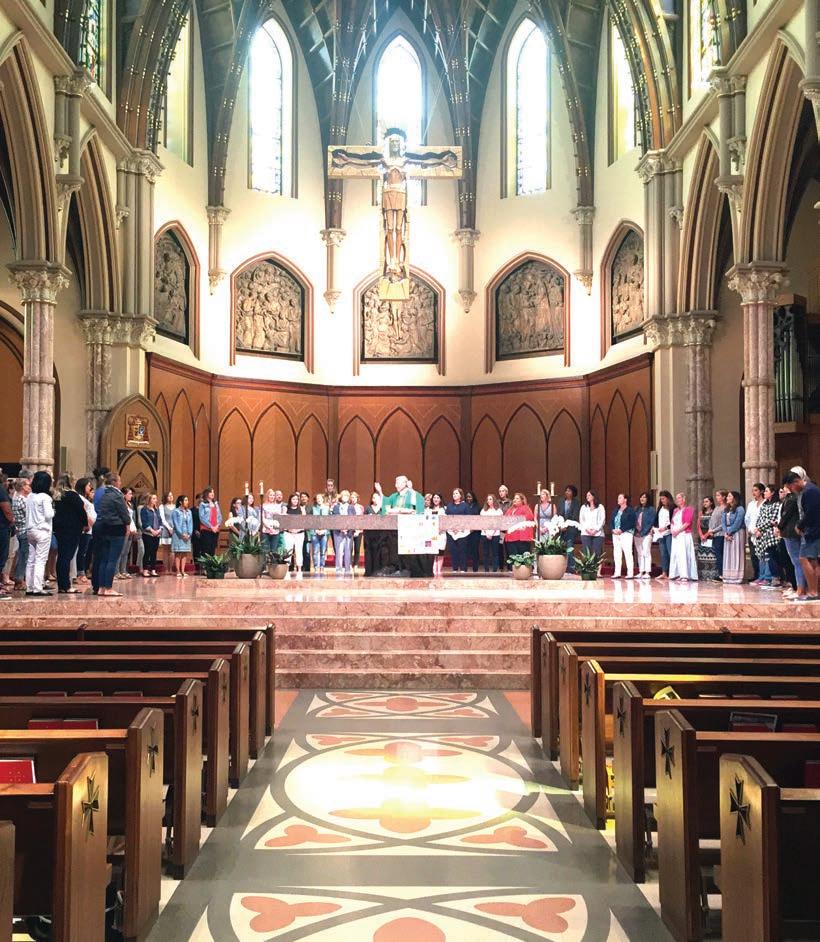
8
Fr. Sakowicz presiding at the opening mass for faculty and staff; (opposite) Fr. Hurley receiving the stole with symbols of many faith traditions
Some Favorite School Activities
FGS: I love celebrating the sacraments with the children. I also really enjoy talking with the students about the service projects that they perform. When the students talk about faith in action, their eyes light up; they sparkle. And I think to myself, isn’t that great! They are talking about how they went together to this shelter, or helped that group, and there’s a sparkle in their eyes and a smile on their faces. Our children are taught to make a difference with their lives, rooted in faith, and they get to experience that in so many ways. It’s funny, isn’t it? We can learn so much in a classroom, but I wonder sometimes how much more we learn outside the classroom.
Challenges and Hope
FGS: In life, change is inevitable, but growth is optional. I will never forget when the Chicago Bulls won their second NBA championship. Michael Jordan was on national TV in the locker room, and they’re all spraying champagne on each other, and he’s hugging the trophy and crying. A reporter put a microphone in his face and asked, “Michael, what’s going through your mind?” Michael answered, “How we can be a better team next year?” I thought, now there’s a standard of excellence. That is also our School’s challenge—we must be in the present moment, where we excel, and also look to the future and strive to be even better with the help and grace of God.
"There’s a tremendous quality to our students—their kindness and their talent and their maturity—that I can see and imagine that these young people will be our future leaders in this city and in the world."
FTH: I agree with everything Greg said, and would add Grandparents’ Day as another really wonderful activity we host. I am fortunate to be over at the Old St. Patrick’s campus and to be able to look out and see the smallest among us, the youngest of our student body, there with their grandparents. I think about these marvelous, heroic figures who are surrounding their grandchildren, and I tell them, “You’re such important players in this whole thing.” Because, let’s face it, sometimes we have to look beyond our mom and dad, and we get to look to grandparents who are just crazy about their grandchildren. I have also found that a lot of the faith traditions are handed down from the grandparents, and that really highlights for me the importance of those connections among the generations and the strength that comes from being part of a faith-filled community.
FTH: When we look at the reality of the world and we see the many challenges that these children will face, it becomes even more important to ask who is going to help them form values, not just right and wrong, but who is going to help them come to understand and appreciate that they are more than just their outer looks, their brains, their wallets, where they live, or what they drive? It is so important that we help our children form a deeper sense of themselves, and realize that each of them is a child of God, called to make a difference in the world and build the kingdom of God. I do not know if they are going to get that in other schools, but I hope and believe that they get it in our School.
FGS: I love the image of the parachute. A parachute is only good if it is opened, but we don’t always pay attention to the details connected with it. True story. A man was eating at a restaurant with his wife many years ago and another diner came up and said, “I recognize you—you were shot down
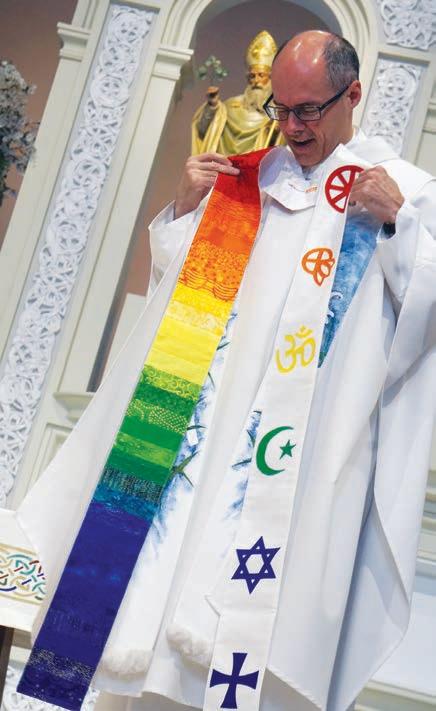
in Vietnam.” The man was startled because he did not recognize this other gentleman, and answered, “Yes, I was shot down, but I survived. How did you know that?” The other man told him, “I packed your parachute.” A few years ago I asked my mom for her definition of motherhood, and she told me, “A willingness to be inconvenienced.” It’s the same for us. We have to be willing to be inconvenienced; we have to do whatever it takes to pack each student’s parachute.
FTH: We do that by staying true to our mission. There’s a tremendous quality to our students—their kindness and their talent and their maturity—that I can see and imagine that these young people will be our future leaders in this city and in the world. People look to The Frances Xavier Warde School because they know of our very fine reputation. It’s a tremendous responsibility, and it is also a wonderful opportunity and is something that we have to continue to maintain and grow.
FGS: One final thought. We also must be open to the Spirit in order to move forward and accept change. Because we are all creatures of habit and the only person who readily welcomes change is a wet baby! n
FAITH
9
FAITH

10
FAITH
Standing at the Intersection of Inheritance and Discovery
By Eboo Patel
Eboo Patel is the founder and president of Interfaith Youth Core (IFYC). Named by U.S. News & World Report as one of America’s Best Leaders of 2009, Eboo served on President Obama’s Inaugural Faith Council and is the author of Acts of Faith, Sacred Ground, and Interfaith Leadership: A Primer. He holds a doctorate in the sociology of religion from Oxford University, where he studied on a Rhodes scholarship.
For over fifteen years, IFYC has operated on the belief that religion should be a bridge of cooperation rather than a barrier of division. Eboo is inspired to build this bridge by his identity as an American Muslim navigating a religiously diverse social landscape.
In August, Eboo spoke to The Frances Xavier Warde School faculty and staff at our annual Mission Day. The purpose of the Mission Day is to set the tone and focus for the year, and Eboo spoke eloquently to us about our identity as “a community of faith that welcomes and embraces all faith traditions.” In early March, Eboo returned to FXW to speak with our parents.
The following is from Eboo’s inspirational messages to the FXW community.
For The Frances Xavier Warde School, being a community of faith has everything to do with history and identity. FXW was started as a Catholic school, as an expression of the Catholic faith tradition that gets its founding with Jesus of Nazareth, and so staying true to that history and identity is extremely important.
Coupled with that, this fidelity has to intersect with the facts of the culture as it unfolds. And the fact of American culture and public life is that it is religiously diverse. An interesting and important question for a range of institutions, including FXW, is: How do we stand at the intersection of inheritance and discovery and look both ways at once? The Catholic tradition offers wonderful resources for this, with one such resource being the very definition of the term “catholic.” Small-c “catholic” of course means “universal” in the original Greek. I remember Father Hesburgh, the President of Notre Dame, once noting to me that the challenge of Notre Dame, and indeed any Catholic educational institution, is to connect its large-C Catholic tradition, the particularness of that large-C tradition, with the universal-ness of the small-c catholic tradition.
The fact that The Frances Xavier Warde School says that we are going to be true to our history, and then goes on to say that this not only allows but also inspires—indeed requires—us to be welcoming to people from a range of identities—that is a powerful articulation of what it means to be a Catholic school today.
The first step is welcoming and fostering diversity, which The Frances Xavier Warde School does so well. Of course, to some extent it is a self-selected diversity because by definition everybody needs to take a step forward into the FXW circle, but the School is nonetheless diverse. Then you try to create a community out of that diversity by saying to young people, “Listen, you have some responsibility in the forming of this community. You have a responsibility in the classrooms and on the athletic fields and through co-curricular activities. We are all community builders. We hope that you not only do that here at FXW, but that you will also learn a set of skills, so that wherever you go to high school or to college and beyond, you are able to look at a diverse set of people and help to form them into a community.”
"So you reflect on your own identity, you realize that you are not isolated in that identity but that identity has to be relational in nature with other people who are different, and then you decide how to be proactive about making your identity a bridge rather than a barrier."
11
FAITH
One of our primary goals at the Interfaith Youth Core is to inspire young people to think of themselves as interfaith leaders. A lot of our work is with college-aged students because that is the age when a lot of people begin to think about their identity and vocation. But younger people can also be ready to begin to think seriously about this, and it is clear to me that FXW proactively raises such questions with its students —Who do you want to be in the world, what difference do you want to make, what’s your vocation going to be?
The goal is to lift up faith and interfaith issues in a way that creates a wider sense of “we,” instead of asking or forcing people to take sides in a kind of a polarized tribalism. That’s challenging in today’s environment, which makes it even more critical for us to try. In order to do that, there are three interesting questions to ask and answer. Number one: Who am I? Number two: How do I relate
positively to you? Number three: What can we do together? So you reflect on your own identity, you realize that you are not isolated in that identity but that identity has to be relational in nature with other people who are different, and then you decide how to be proactive about making your identity a bridge rather than a barrier. Finally, you ask the question: What kind of community do we want to be? What will we do together?
That may all seem sort of abstract, but it is both encouraging and useful to look at history with an appreciative and positive lens, to seek examples of where interfaith engagement has made a constructive difference, and ask the question, “What does it mean for us to do similar work in our own era?” It goes back to St. Francis of Assisi, who travelled to Egypt in the middle of the Fifth Crusade to try to nurture a positive relationship with Sultan Malik al-Kamil; they talked about prayer in a time

of war. It’s also worth noting that Chicago has played a special role in interfaith dialogue in American history. This is the city where the first Parliament of the World’s Religions was held in 1893. It is also the city in which Martin Luther King, Jr. first met Rabbi Abraham Joshua Heschel, at the Chicago Conference on Religion and Race in 1963, which was convened by Catholic, Protestant, and Jewish leaders. Cardinal Bernardin was of course also a very important figure in interfaith dialogue in the latter part of the 20th century. So Chicago, and the Catholic Church, have played a special role in inter-religious engagement.
I view The Frances Xavier Warde School as being not only a part of that tradition, but really a leader in interfaith activities. That is a very important part of the School’s history and identity. FXW is a Catholic school that leads in interfaith engagement, and that is something that should and must continue. n
My dad went to the University of Notre Dame in the 1970s; that’s how we came to this country from India. When we were kids, he would take us to campus on football Saturdays. Now my dad is not an especially ritualistic Muslim, but he would always stop at the Grotto when we were on campus, and I would watch him cup his hands and whisper Muslim prayers. That seemed incongruous to me, so one time I asked him, Why is it that this Catholic shrine is one of the only spaces that inspires you to return to Muslim prayers? He pointed to the light in the cove that is the Grotto, with all of those flickering candles, and he said, “The Quran describes God as light upon light.” I thought that was a really beautiful moment of resonance between two different religious traditions, and it is something that has always stuck with me. Islam and Catholicism are very different in many ways, but they share this very deep spiritual resonance of light as a central expression of spirituality. The commonalities among faiths are there, if we are open to seeing them.
—Eboo Patel
12
Building Interfaith Literacy
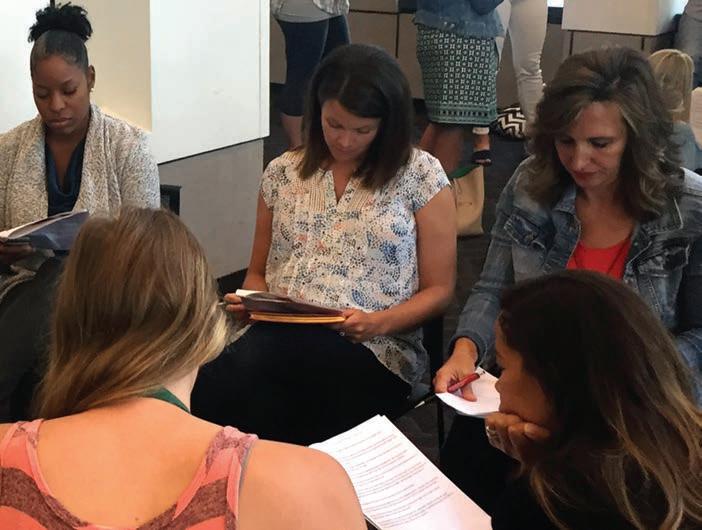
What are the goals of this year’s focus on our faith Charism? For the FXW faculty and staff, one of the main goals is to build our individual and collective interfaith literacy.
To that end, a major component of the staff’s professional development this past summer was to expand our understanding of religious beliefs and practices by reading one of five books: The Book of Joy, by the Dalai Lama and Archbishop Desmond Tutu; Catching Fireflies, by Patsy Clairmount; The Faith Club, by Ranya Idliby, Suzanne Oliver, and Priscilla Warner; and Acts of Faith and Sacred Ground, both by Eboo Patel. Faculty and staff then used Yammer, a private social network, to share reflections, tag certain themes, and react to each other’s posts. When everyone came back to School in August, the discussion of the readings continued, culminating with the conversation with Eboo Patel on Mission Day.
In addition to Eboo’s presentation, five alumni from the Interfaith Youth Core (IFYC)—each of whom was raised in a different faith tradition—spoke about their own faith journeys and how their school experiences helped to shape those journeys. They also presented IFYC’s “interfaith triangle,” which consists of attitudes, knowledge, and relationships; the triangle is effective when each element informs and strengthens the other two.
The School has also been using resources from Harvard University’s Pluralism Project to build interfaith literacy. Specifically, at both the Mission Day and at subsequent staff development days, faculty and staff have broken into small groups to discuss various case studies developed by the Pluralism Project. The goal of these case studies is to develop a deeper and more nuanced understanding of what pluralism is and what it is not.
Through these efforts we now have a much better awareness of the differences with diversity and pluralism. Religious diversity, like any form of diversity, is a given in today’s world; it describes a particular group or situation but there is no normative value attached. Pluralism, on the other hand, requires deliberate and active engagement with diversity; it is a choice. Likewise, pluralism is more than tolerance. Religious tolerance is of course a good thing, but it does not require any sort of interaction with or knowledge of other faith traditions. Pluralism goes further through dialogue, kinship, and an openness to learn. It does not however, as Eboo Patel made clear, require us to leave our identities and beliefs behind; through the encounter with different traditions, we can gain a new perspective on our own faith as well as the faith of others. Finally, pluralism does not demand consensus or compromise. Not everyone will agree, but everyone must be willing to be in conversation.
With this increased knowledge of and appreciation for religious practices throughout the world, coupled with a more complete understanding of interfaith ideals, faculty and staff are better able to promote pluralism in matters both small and large. This is professional development in its purest sense, with the School’s mission informing and guiding its employees, who then in turn help to shape and define that mission through their work and their wisdom. n
13
FAITH
FAITH
MOONBEAMS & SHOOTING STARS: A HISTORY
by Brigid Cashman

Brigid Cashman has been a member of The Frances Xavier Warde School community since 1992 as both a parent and a staff member.
Do to others whatever you would have them do to you.
—Jesus Christ (Christianity)
Spoken over two thousand years ago, these enduring words are considered the “Golden Rule” in the Catholic/Christian traditions. The sentiment behind these words is not exclusively Christian, however; similar guidance can be found in many of the world’s faith traditions. It was ecumenical teachings such as the “Golden Rule” that impelled the founders of The Frances Xavier Warde School to create a new and inclusive Catholic school unlike any other in the Archdiocese of Chicago: a school where children of all religious traditions could learn to live the universal Gospel values of love and compassion and find similarities rather than differences among their respective faiths.
What is hateful to you, do not do to your neighbour. This is the whole Torah; all the rest is commentary. Go and learn it.
—Rabbi Hillel (Judaism)
The dream was visionary. Opening—not closing—a Catholic school in the Archdiocese of Chicago in the late 20th century was an unusual event. But instead of being daunted by this, FXW’s founders were galvanized by their ambition to replicate the diversity of the city of Chicago—including religious diversity —within the four walls of this new school.
Mary Ellen Caron, the School’s founding principal, believed that we evangelize best when children are invited to be faithful to their own religious tradition. Thus, in addition to offering instruction in the Catholic catechism, from the beginning we have offered two religion tracks: Catholic and Interfaith.
The goal, though, was not just to understand one’s own faith tradition more fully, but also to witness firsthand the striking similarities among the teachings and values of all faiths. Doing so creates a profound sense of community.
One should treat all creatures in the world as one would like to be treated.
—Lord Mahavira (Jainism)
The dream was inclusive. The intent was not only to include all faith traditions but also to honor them in the most authentic ways possible. While Catholic values would permeate daily instruction, the interfaith students should feel valued, and not feel like outsiders or “less than” because they were not Catholic. Thus, the names of the two religion programs were born: the track for Catholic students became “Moonbeams” and the Interfaith program was named “Shooting Stars.” These celestial entities both create and provide light. Both are beautiful to behold, and their value and splendor are equal.
Not one of you truly believes until you wish for others what you wish for yourself.
—Prophet Muhammad (Islam)
The dream was bold. Those early FXW visionaries were passionate about religious inclusion and firmly believed that a truly Catholic, truly ecumenical approach was possible. The question then became, How do we craft a worthy and robust interfaith curriculum to mirror that of the Catholic catechism? The answer involved a lot of hard work and a willingness on everyone’s part both to share their own faith
14
FAITH
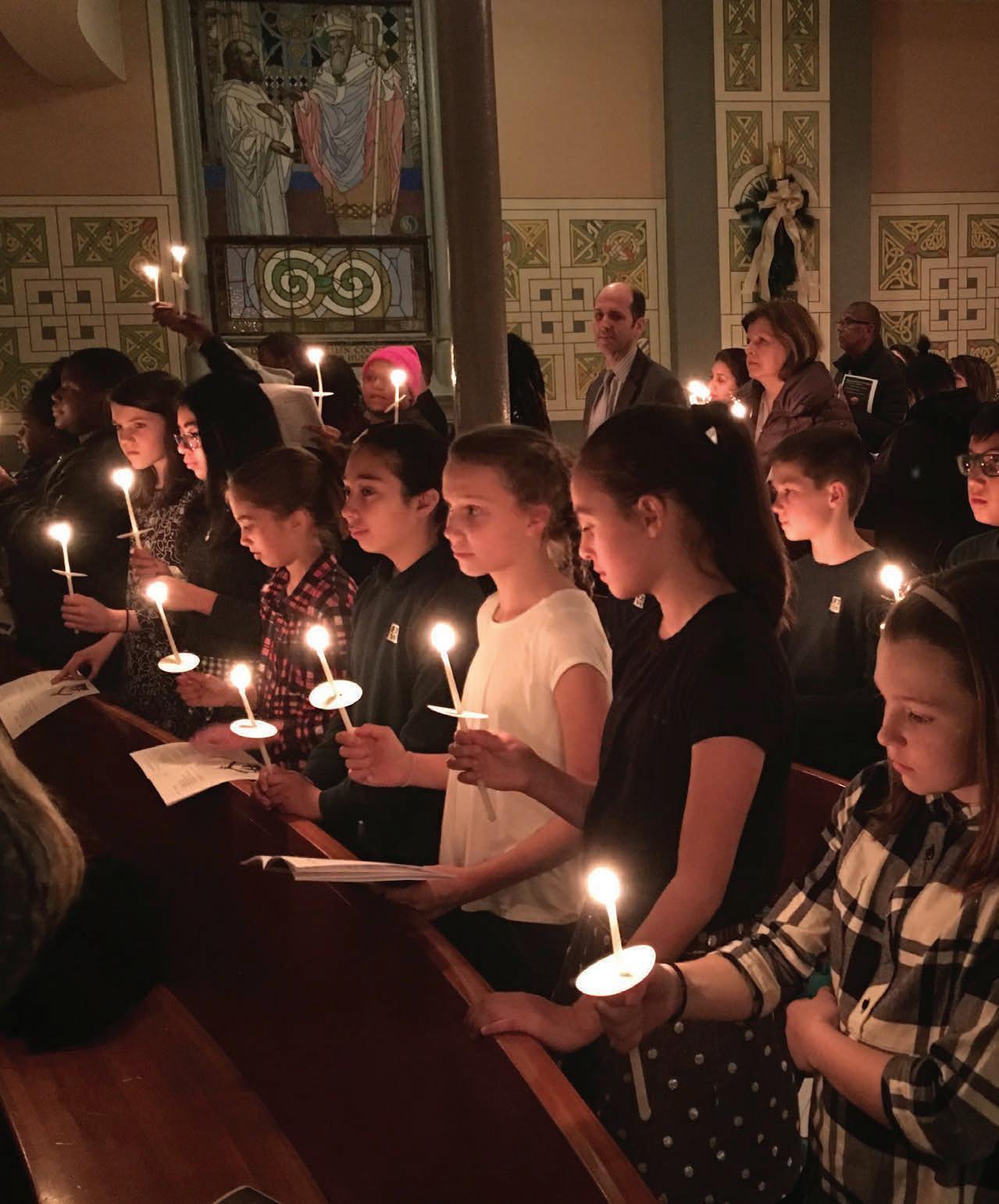
“First and foremost, we were taught ‘treat everyone the way you would like to be treated.’ An atmosphere of empathy permeated our FXW experience. Our teachers taught by example to love one another and ourselves.”—Stephen Bedalow, ‘98
“In our religion classes—Moonbeams, for Catholic students like myself, and Shooting Stars, for students of all other faith traditions—I realized how your faith can help you become a stronger person as you come to understand your own values. However, what made our religion class discussions unique was that we never spent time focusing on the right way to have faith. Instead, each student was able to explore what faith meant to him/her regardless of his/her religious background.” —Geomele Moya ‘99
15
FAITH
experiences and to listen to the experiences of others. Students were grouped only for religion classes and were not separated or distinguished in any other way. The Interfaith/ Shooting Stars curriculum was built from scratch, using universal Gospel values and lessons from the faith traditions represented by the students themselves. The quality and effectiveness of the Shooting Stars program was continually reviewed, and the curriculum evolved over time into the comprehensive program that exists today.
Do not do to others what you do not want done to yourself.
—Confucius (Confucianism)
The dream has become reality. Recently, teachers and staff realigned the Moonbeams and Shooting Stars curriculums to be more structured and to focus around six universal pillars, or themes, which are Tenets of Faith; Liturgical Education; Morals, Ethics and Values; Prayer and Meditation; Life, Community, and History; and Service and Social Justice.
There has also been a conscious recognition of the incredible resources provided by our parents and other volunteers, as well as through our partnerships with Old St. Patrick’s Church and Holy Name Cathedral. For example, when the 6th grade curriculum was structured to teach the Old (Hebrew) Testament to both religion tracks, Jewish families and teachers were asked to lead the grade-level Seder Meal during Passover, and the pastors of Old St. Pat’s and Holy Name were present to help connect Jesus’ Last Supper to the Jewish Passover meal. Second grade students have a similar, but age-appropriate, experience when they study and celebrate the Seder Meal and its connection to First Communion in the Catholic Church. For the second graders, the Seder is the culmination of their year-long study of Judaism, and the Shooting Stars host the meal for the Moonbeams, with help from parents of the Jewish faith.
Ministers of other faith traditions—including several FXW parents—have also been invited to preside at interfaith prayer services. We recognize that we must constantly seek to
improve, and to that end the School surveyed FXW families in order to be more aware of and better serve families of all faith traditions.
Treat not others in ways that you yourself would find hurtful.—The Buddha (Buddhism)
The dream continues beyond our walls. The ultimate success of our Moonbeams and Shooting Stars programs is measured both by the experiences of our students while they are at The Frances Xavier Warde School and by the life lessons and worldviews that our alumni take into the world. While here, the reverence afforded all students, regardless of their background or creed, provides invaluable instruction about self-respect as well as respect for others. By the time they graduate, our students have connected deeply to the world around them through their studies, their relationships, their service, and their faith. They truly understand what it means to treat others how they wish to be treated and are fully ready to share their gifts and talents as they embody their own version of the “Golden Rule.” n
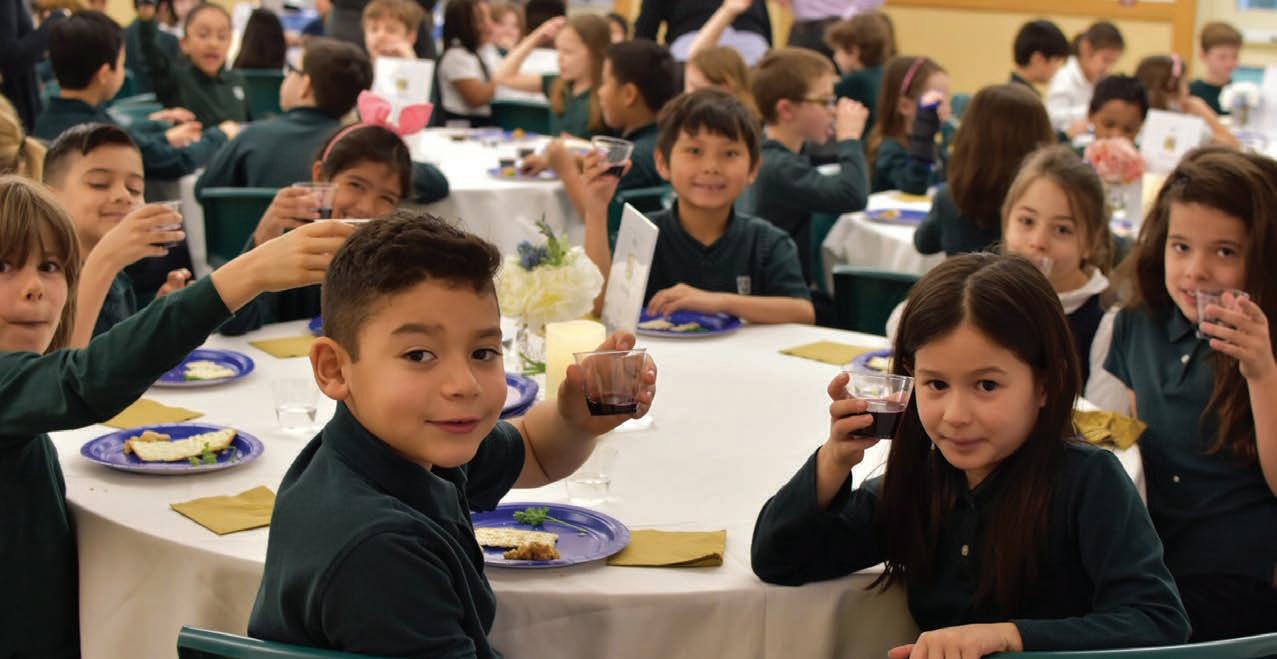
16
Second grade students celebrating a Seder Meal.
FAITH
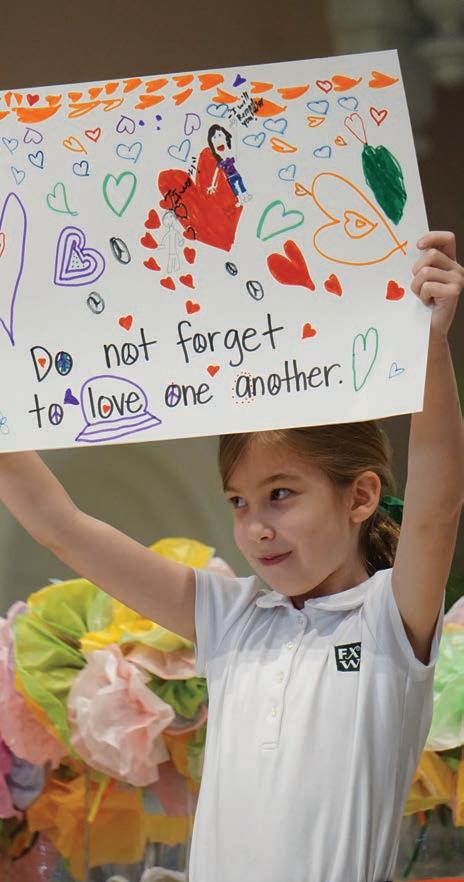
FXW models Francis of Assisi's words, "Preach the gospel; if necessary, use words." Each grade level is given the responsibility to live the Gospel with their life. Students are expected to begin this good news in their classroom community—sharing kindness, respect, and love with one another. From there, classes look outward—taking on service opportunities and inspiring a relationship with those in need. As a student at FXW, faith was a conversation spoken with our words and our actions. Learning about one’s faith extended beyond the Church's catechism, to other world religions. As an educator now, I feel that I am just starting to appreciate the unique culture of faith at FXW—one that invites everyone to the table. —Emma Fleming ‘08
The Religious Education Experience
Unique from the very beginning, a great deal of intentionality has been put into the interfaith curriculum in the last few years, providing more structure and depth. Both the Moonbeams and Shooting Stars study the major world religions including Catholicism; the Moonbeams’ primary focus is on the Catholic faith and traditions, particularly during sacramental years, while the Shooting Stars concentrate on a different world religion each year. Whenever possible, the same general themes—based on morals, ethics, and values—are explored by both the Moonbeams and Shooting Stars, which provides an important connection between the two programs.
All students are together for religious education in the Preschool and Kindergarten programs, and they follow the same general themes as the older children. Both Preschool and Kindergarten also have their own prayer services; these are normally led by the students’ teachers, which provides a sense of familiarity and comfort to the services. Prayer and meditation are present at all grade levels, so even the youngest students quickly learn these fundamental practices.
Beginning in first grade, students are grouped into Moonbeams and Shooting Stars; typically there are three sections of Moonbeams and two sections of Shooting Stars. The initial division is itself educational, as the students realize, often for the first time, that there are many different ways of expressing faith, and understand further that no faith tradition is superior or inferior to any other.
Being exposed to a variety of religious traditions in a multiple ways is of critical importance for living in the world today. It also fuels the children’s compassion and curiosity in positive ways. Much of the curriculum is designed to deepen the students’ interest in their own faith, and then provide both guidance and space to allow them to explore and answer many of their questions on their own. This is further enhanced by numerous conversations among the students, both structured and informal, about what it means to live a life of faith.
While much is gained through their classroom studies, the students also learn a great deal through Catholic masses and interfaith prayer services. In addition to the overarching message or theme of the celebration, students gain an appreciation for how the component elements—including the physical space, the music, and the tone and structure—impact the overall experience.
Students also benefit from the very open and safe environment that is created both in the religion curriculums and throughout the day. Each morning begins with the Prayer of St. Francis—chosen because it is widely known as a prayer of peace and a call to service, and its broadly inclusive language appeals to diverse faiths—and with special intentions that the students or teachers would like to offer. Perhaps the best illustration of the success of the program, as well as the environment that is engendered, is the fact that the children quickly become very comfortable with and dependent on this communal prayer.
One of the great ecumenical events of the school year occurs on the last day before Winter break. The Season of Light Prayer Service celebrates the central image that light plays in numerous faith traditions, including Hanukkah, Kwanzaa, and Advent. Students sing, read poems, reflections, and scripture passages, and present original research on the many ways that “hope in darkness” is expressed through all faiths. In form, function, and message, the Season of Light Prayer Service epitomizes the religious education experience at The Frances Xavier Warde School. n
17
FAITH
FULL CIRCLE
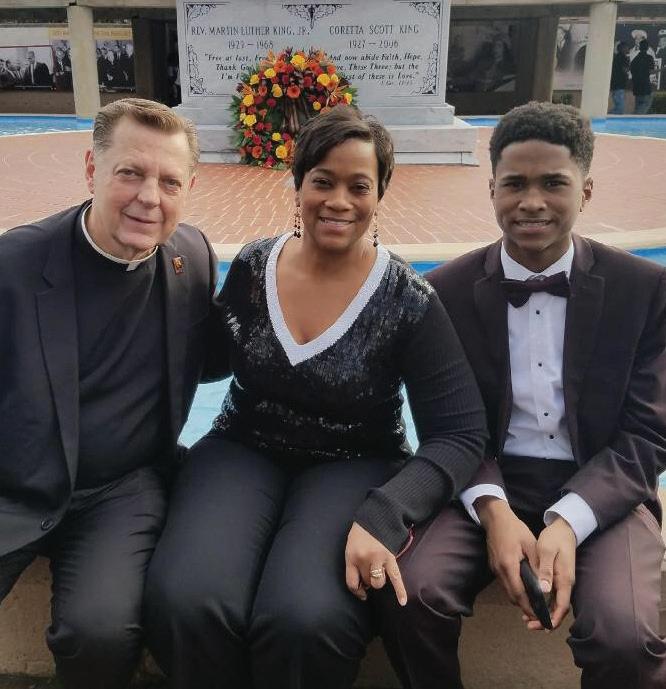
January 16, 2017, was a special day for FXW parent Cheryl Clark and her son Chazz (FXW Class of 2017). It was a bittersweet day, filled with a myriad of emotions; a day, in Cheryl’s words, that “felt like we had come full circle.”
On that winter day, Cheryl and Chazz were the special guests of the Rev. Michael Pfleger, the Senior Pastor of The Faith Community of St. Sabina. They were in attendance as Fr. Pfleger gave the keynote speech at the Dr. Martin Luther King Jr. Annual Commemorative Service at Ebenezer Baptist Church in Atlanta. Fr. Pfleger’s connection to Dr. King can be traced back to 1966 when, as a sixteenyear-old boy, he went to Marquette Park to observe the fair housing march led by Dr. King. “I witnessed not only a painful display of violence and hate that I never imagined,” Fr. Pfleger says, “but also the greatest display of strength, determination, and the power of non-violence and love that I had ever seen. That experience changed my life forever.”
More than fifty years later, the Clarks joined Fr. Pfleger as he commemorated the tremendous impact that Dr. King had and continues to have. They were at his side on that day not just because they are close friends. That day – Dr. Martin Luther King Jr. Day, January 16, 2017—was also the one-year anniversary of the tragic death of Vince Clark, Cheryl’s husband and Chazz’s father.
Vince worked at St. Sabina for over 34 years. Fr. Pfleger was not only his boss but also his neighbor and best friend. The closeness of their bond is reflected in the fact that Fr. Pfleger always refers to Chazz as his nephew. “As I watched my nephew journey through FXW,” he said, “I became even more convinced that when our children are exposed to the excellence of education and the power of faith, we can form future leaders who can follow in the footsteps of Dr. King.”
The intersection of faith and education, and the transformative power that arises when the two are combined, was a central part of Dr. King’s message, just as it is a central tenet of the mission of The Frances Xavier Warde School. The combination of faith and education is also what brought Chazz to FXW in 5th grade. It was Vince who pushed for the change in schools. Even though his son was at an excellent school, Vince strongly believed that FXW could offer something more. After his death, that “something more” was sadly, beautifully evident in the loving support of the School community, which helped to sustain Cheryl and Chazz through their loss.
Fr. Pfleger’s passionate words at Ebenezer Baptist that day not only commemorated Dr. King’s life and legacy. They also honored the life and legacy of his dear friend, his brother, Vince Clark. Knowing that, his closing remarks have a special resonance:
My sisters and brothers, I close today as Dr. King always did— with hope. No matter the severity of our problems, no matter the thickness of our darkness, no matter the magnitude of our clouds, I am not hopeless nor despairing. My sisters and brothers, quitting is not an option or an alternative. Because hope is stronger than hopelessness, love is more powerful than hate, peace is greater than violence. Brothers and sisters, the battle is the Lord’s. And there is still, in 2017, there is a still a Balm in Gilead that can heal this sick, sick soul. No weapon formed against us, no weapon formed against us, no weapon formed against us shall prosper. We shall overcome.
Fr. Pfleger’s words on that special day in 2017 were not his first at Ebenezer Baptist. In 2003, he was also asked to speak at the Atlanta church for the Commemorative Service for Dr. King. Fr. Pfleger, unsure of what to say and unclear about what his role should be in the service, was reluctant to go. It was Vince who convinced him that he should speak, and Vince accompanied Fr. Pfleger that day to provide support. Fourteen years later, with a heavy heart, Fr. Pfleger was again hesitant about speaking on Dr. King’s—and Vince’s—day. This time it was Cheryl and Chazz who encouraged him to go and, just as Vince had, they went with Fr. Pfleger to Ebenezer Baptist to provide support. They had all come full circle. n
18
Fr. Michael Pfleger with Cheryl and Chazz Clark at the Martin Luther King Jr. National Historical Park
We Rise by Lifting Others
by Cheryl Clark
In honor of her husband Vince and their relationship with Fr. Michael Pfleger, Cheryl Clark delivered the following remarks at the 2017 FXW Mothers’ Day luncheon.
This is the day that the Lord has made, I shall rejoice and be glad in it!
Welcome to The Frances Xavier Warde School 2017 Mother's Day luncheon. I am honored and humbled by this opportunity to speak. This year’s theme—“We Rise By Lifting Others"—is amazing to me because I stand here today only because others have lifted me.
I grew up in a loving household. My mom and dad were married for over 60 years and made great sacrifices for their children. My mom, Mrs. Geraldine Moss, was a stay-at-home mom, and as I got older I realized that her job was never done. I have been a Chicago police officer for twenty-two years and I know that my mother's job was much harder than mine. Thank you mom for lifting me up!
I met Vince Anthony Clark when I was in grammar school. We were really good friends and could talk about anything. When we were in high school, I attended his prom with a friend of mine who did not have a date. That did not go over well with Vince. He walked up to me and said, “You look absolutely beautiful but you should be here with me!” We began dating shortly after.
Vince worked for Fr. Mike at St. Sabina Church for 34 years; he was the assistant to the Pastor. They were also best friends.
In 1995, I decided I wanted to become a Chicago police officer. Vince was supportive as always and helped me to fulfill my dream and enter the police academy. Thank you Vince for lifting me up!
I married my best friend on July 19, 1997. Then, on March 11, 2003 (the best day of my life) our son, Chazz Anthony Clark, was born. Chazz was a beautiful healthy baby from head to toe. Vince taught him everything, from how to walk to how to use the potty. He called Chazz his Big Boy. He even gave him his first haircut. Chazz’s first words were Da Da. He taught him how to play baseball and the drums and became his baseball coach. Thank you Vince for lifting Chazz up!
Chazz started school at Morgan Park Academy at 3 years old and stayed there until the 4th grade. Vince decided that he wanted more for Chazz, and although I was not on board, he wanted him to attend FXW. I am not one for change. Chazz loved FXW right away and very quickly and began making friends. He asked, "What took you so long to find me a new school?” Vince was thrilled and never let me live that one down.
In 2000, Vince had a stroke and was diagnosed with lupus. You would never know because Vince would never complain and would keep going even when he was not feeling well.
The morning of January 16, 2016, I kissed my husband and went off to work. I had to be in court that day. While I was there, my partner Sabrina called and told me that her mom, who had been battling cancer, had just passed away. I jumped in the squad car and went to comfort and pray with my partner. I called Vince to tell him the news, and he sent a beautiful, supportive text message to Sabrina.
I left the hospital around noon and called Vince to ask him to run some errands and take Chazz to my mother’s. I arrived home at 1 p.m. and the house was empty. I called Vince but his phone went into voicemail.
I went out to get something to eat, but I was abruptly called back home. I knew something was not right. I arrived home and saw two state police cars, and I jumped out of my car and asked, Where is my husband? They replied that Vince had been in an accident, and that he did not survive. That was it. The worst day of my life!
As the first anniversary of his father’s death neared, Chazz organized a massive group text among the FXW community, encouraging people to perform acts of kindness to honor Vince’s life.
This year, on Vince’s second anniversary, Chazz went to his father’s favorite coffee shop and bought everyone there a beverage. He then went to Vince’s favorite donut stand and again treated all the patrons. After that, he went to the local bus stop and passed out gift cards.
Cheryl Clark says that her husband Vince, like Martin Luther King Jr. and like Fr. Michael Pfleger, “fought for those whom society has forgotten.” His son Chazz is following in Vince's footsteps. He is living the legacy.
FAITH
19
FAITH
His earthly Father and his Heavenly Father had him just where he needed to be— in loving, faith-filled environments, where he felt and continues to feel the love and support from all those who have lifted him up.
The State Police gave me the phone number of a witness who wanted to talk with me. Not only did this man stop and render aid to Vince, he prayed with him and followed him to the hospital, and he and his wife later attended his funeral. He told me that Vince, who had had a massive heart attack while driving, died peacefully. We rise by lifting others!
When Chazz, Fr. Mike, and I arrived at the hospital, everyone was there— my police colleagues, friends, neighbors, and family. I remembered the comforting text that Vince had sent my partner Sabrina and I read it to the crowd. Even in his death Vince was still lifting us!
While preparing for Vince's services, my FXW family sprang into action. We received food, phone calls, text messages, prayers, and words of encouragement. All I could think about was Chazz being a member of St. Sabina Church and a student at FXW. On the night Vince died, Chazz said to me, “Ma, I’ve had my dad for twelve years and in those twelve years dad has done twelve million things with me. I know I'm going to see my dad again in Heaven.” His earthly Father and his Heavenly Father had him just where he needed to be—in loving, faith-filled environments, where he felt and continues to feel the love and support from all those who have lifted him up.
FXW has prepared Chazz well for his next chapter. He will be attending Marist High School, the first FXW alum to go there. He told me, “Ma, I'm going to be the Change at Marist.” Fr. Hurley, a Marist alumnus, encouraged Chazz and promises to keep watch over him. Thank you for lifting Chazz up!
Thank you also to the 8th grade parents who have done so much for Chazz, bringing him to Bears games and baseball games, driving him home, taking him for community service hours, feeding him, coaching him, and most of all loving and lifting him up!
To my pastor, Fr. Michael Pfleger—you have done everything for us. Chazz and I could not make it without you. You are our family and a great role model for Chazz. You taught him how to stand up and not only fight for what is right, but also for the people who cannot fight for themselves. Thank you for lifting us!
To all of you Mothers, Grandmothers, Nannas, Big Mommas, StepMothers, and Women: stand strong, stand tall. Our world needs you now more than ever. May God continue to lift you all up so you can continue to lift others.
Happy Mother's Day, FXW! n
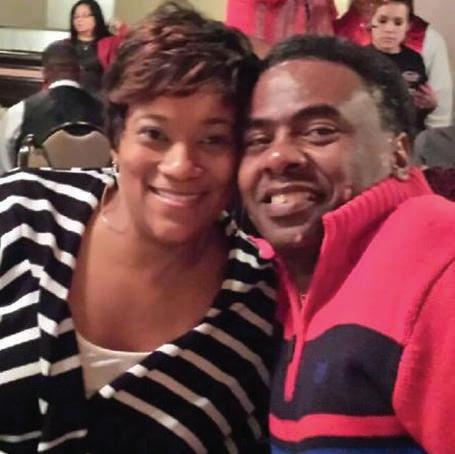
20
Cheryl and Vince Clark
“Are You Learning the Bible?”
by Caitlin Doermer ‘05
Since graduating from Washington and Lee University with a Bachelor’s degree in Journalism and Mass Communications, Caitlin has worked in advertising in New York and Chicago. She is currently a copywriter and freelance writer, specializing in health and beauty brands. Caitlin will be attending Notre Dame Law School in the fall.
“It’s a parochial school,” was a common phrase my mother liked to add when people asked where I went to grade school. Being light-hearted, but a devout Catholic, it was her tongue-in-cheek way of saying, “Frances Xavier Warde is kind of a Catholic school.” She was not wrong, but I would expand her statement by saying that FXW is not just a Catholic school. It is not just Catholic, and it is not just a school. During my eleven years at FXW, I came to understand that The Frances Xavier Warde School is an educational community of faith that teaches, guides, and welcomes all. I credit a large portion of my spirituality, acceptance, and appreciation for diversity of race, background, and opinion to FXW’s distinctive approach to religious education.
In addition to Catholic teachings, I remember learning about Jewish Passover traditions

and sitting down for a Seder in the 2nd grade, and learning about the Five Pillars of Islam during my 5th grade religion class. At that age, we were too young to understand the divisive nature of differentness. The approach was definitely not that Catholicism was “right,” thereby implying that every other faith tradition was somehow “wrong.” Instead, we were taught that we were part of a global community, despite the differences in our belief systems.
For a Catholic school, this emphasis on interfaith understanding felt unique, and at the time, slightly confusing to my family. After coming home from school and excitedly sharing all of my new knowledge, my mom would often respond, “That’s great! But are you learning the Bible?” As she knew, the answer of course was “yes,” but the extent of this only became apparent to me a few years later.
The beauty of the parables of the New Testament blew my mind— stories of compassion, generosity, and the miracles of Jesus deepened my faith on a level I did not anticipate.
21
FAITH
Caitlin Doermer (left) with classmates Nora Downs and Cassidy McAloon.
FAITH

22
Particularly in our increasingly globalized community, it is necessary to understand and appreciate the factors that make us different, so that we can come together in a more productive and unified manner.
In 7th and 8th grade, our curriculum took an in-depth approach to the teachings of Jesus and the stories of the saints. The beauty of the parables of the New Testament blew my mind—stories of compassion, generosity, and the miracles of Jesus deepened my faith on a level I did not anticipate. I remember taking extreme care in choosing a Confirmation saint. I researched extensively to ensure I chose the ultimate example God’s love, but also a saint to whom I felt inexplicably connected—St. Frances of Cabrini.
Admittedly, focus was difficult for me as a child. But my FXW religion classes were not another 45 minutes merely to sit through, watching the clock. These were classes I took seriously—I saw them as an important
reflection of who I was, and for that reason, I wanted and needed to devote my full attention. I wholeheartedly believe that my appreciation for Catholicism was sown in those early years, first taking in a holistic view of the world’s faiths, and then learning the special and divine aspects of my own belief system. Hearing the stories of others, I wanted to learn more about my own story.
FXW’s method of religious education – this amazing exposure to many different faith traditions – also helped me to realize that spirituality, by any definition, is a uniting factor among people all over the world. Particularly in our increasingly globalized community, it is necessary to understand and appreciate the factors that make us different, so that we
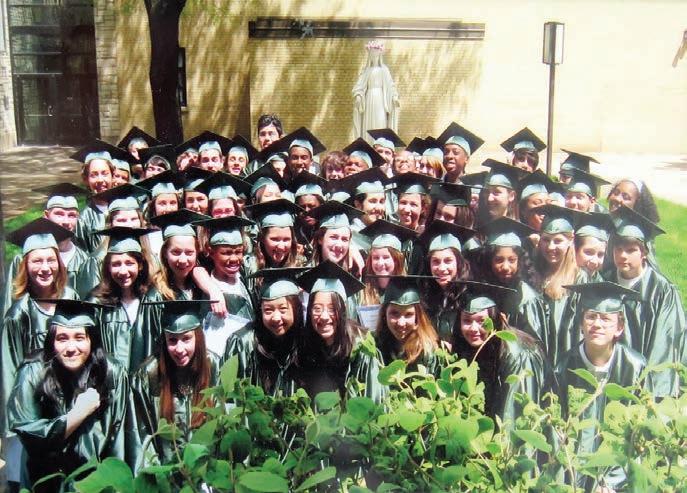
can come together in a more productive and unified manner. FXW taught us how to thrive in a pluralistic community because FXW was a pluralistic community.
I recently learned that the word parochial can be interpreted two ways. Most commonly, “Of or relating to a church parish.” But it can also be defined as “confined or restricted as if within the borders of a parish … provincial.” Or parochialism: “selfish pettiness or narrowness (as of interests, opinions, or views).” Through its strong connections to Old St. Pat’s Church and Holy Name Cathedral, The Frances Xavier Warde School is certainly parochial under the first definition. But using the alternative definition, it is anything but parochial. FXW taught me what it meant to be Catholic, but it never restricted my curiosity or worldview. On the contrary—all of my religion teachers at FXW taught me open-mindedness, acceptance, and the fundamentals of operating in what has always been a multi-faith world. I thank FXW for choosing a more thoughtful approach to religious education, and for their role in raising me and thousands of other loving human beings. n
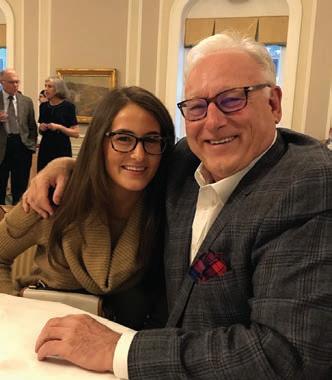

FAITH
23
The FXW Class of 2005, and Caitlin with her mother Kathleen and her father Richard
DIVERSITY IN FAITH: A PARENTAL PERSPECTIVE
In what ways does The Frances Xavier Warde School defy that stereotype of the "traditional" Catholic School experience? The religious make-up of the families is illustrative—a majority are Roman Catholic, but there are a wide variety of other faith traditions within the School community, including Judaism, Islam, Hinduism, Jainism, and many different Protestant and non-denominational Christian faiths.
On the one hand, this is not surprising, given that we explicitly identify ourselves as “a faith community that embraces and welcomes all other faith traditions.” But it is one thing to welcome and embrace other faith traditions; it is another to overcome the skepticism and stereotypes and convince those families to join the FXW community. So what is it that makes FXW so appealing?
For some, of course, it may simply be FXW’s academics, or its racial and socioeconomic diversity, or even its location or reputation; the faith component may be, at least initially, a secondary reason or even a non-factor. Even if they did not initially consider our faith Charism as a major role in their school choice, nearly all parents and students agree that it shapes the overall FXW experience in significant, positive ways. To learn more about why this is true, we talked to three parents from faith traditions other than Catholicism: Jena Doolas and her daughter Athena ’18 are Jewish; Douglas Thornton and his sons Joshua ’16 and Nathaniel ’19 are members of the Victory Apostolic Church, where Douglas is the Associate Pastor; and Christian Coon, quoted above, is a minister and co-founder of Urban Village Church, a United Methodist church. While they do not claim to speak for others, their thoughts and experiences echo those of many FXW families.
“Whenever my wife Anne and I tell people that our children go to a Catholic school, we are sometimes met with a certain skepticism; there is a definite stereotype about the traditional Catholic School experience,”says Christian Coon, a United Methodist minister and father of Caroline ’15 and Ethan ’19.
What are some of the benefits of FXW’s embrace of all faith traditions?
Douglas Thornton (DT): There is an inherent value in simply being part of a diverse community. When you have someone of the Jewish faith, or who practices Hinduism or Buddhism, or is a Protestant or a Catholic, the kids do not really think about that. As long as you play the same video game, or like the same sports team, or want to hang out at recess, then okay, we’re friends. Whatever their differences are, they are not a barrier to friendships. That’s the beauty of it.
Christian Coon (CC): My son had gone to preschool at another Catholic school, so we were certainly open to the possibility of a faith-based school. As we looked more closely, the ecumenical nature of FXW was really appealing, and we have really come to appreciate FXW’s emphasis on faith, particularly the effort to look at faith from many different perspectives.
Jena Doolas (JD): I agree, but I also think that there is more. At Athena’s previous school, there were students from different faiths, but there was no space and time created for any exploration. You could be sitting side-byside with someone for years, but not really have the guided questions to learn more. The fact that FXW offers that space and time creates more dialogue, and therefore more opportunity to understand and learn.
How has our faith community impacted you and your family?
JD: That strong sense of community has been really important for us. There is a closeness here that is much different from my middle school experience. I do not know if the faith component is the reason for that, but it certainly does not hinder it. Last fall, we went to Mexico for the quinceañera of one of Athena’s classmates. She has some really wonderful friends—and now I am friends with her friends’ parents.
DT: As ministers at Protestant churches, Christian and I have been invited to participate in several of the interfaith prayer services here at FXW. We have been able to preside at or lead prayers for quite a few of these services, and that has been a great way for us as parents to get involved in the life of the School.
CC: I have also had the opportunity to go into the classrooms at OSP and talk about prayer; other parents also come in and share aspects of their own faith traditions. Every year, our church also brings Ash Wednesday to the streets of Chicago, and I have been on WGN radio a few times to talk about that. A few years ago, I invited Fr. Hurley to be on the radio with me to discuss Ash Wednesday, so we did that together and were on the radio together again this year for Ash Wednesday. That openness to talking about faith, and the eagerness to find joy in one’s own faith experience, is very important to us.
FAITH
24
FAITH
What values can be gained from FXW’s approach to faith?
CC: Having respect for others and their backgrounds—that is the baseline. But what I see at FXW is more than that. There is an appreciation for, even a celebration of, different faith traditions.
DT: I always say, diversity comes in all shapes, sizes, and forms. It is not enough to simply appreciate the diversity or tolerate it. Diversity of faith, just like diversity in race or socioeconomic status, provides an opportunity to learn from others, and it also provides an opportunity for you to bring a different perspective to the table. FXW’s approach to faith provides those opportunities and fosters that desire to learn more.
JD: The community service component, which really grows out of FXW’s emphasis on living one’s faith in action, is very important to us. There is a freedom to perform service that is meaningful to you and your own faith tradition, but there is a guidance and a structure to the program that is beneficial to the kids.
How has FXW’s faith education shaped your children?
DT: We love the fact that FXW is saying, We are not trying to convert you, we are not proselytizing; we are trying to educate. What every parent wants for his or her child is the opportunity to explore, and have every opportunity, every possibility, every experience open to them. So we want our children to know that there are more thoughts and beliefs in this world than Catholicism or Protestantism; having that exposure to other traditions is invaluable.
JD: Athena has definitely gained what some people call the “soft skills,” but what I like to refer to as “hard skills” – things like persistence,
kindness, and a hunger to learn. They are all the things that make you a really good person, someone that others will want to work with and be with, and that comes from the whole FXW experience.
CC: More than anything, our kids need to know that they are loved, and understand that God loves them. I explore this idea in my book Failing Boldly [see the excerpt in the sidebar]. When we know, really know, that we are loved, then we are willing to take risks because we know that if we stumble, someone will pick us up, and if we fail, we will still be loved. That is the kind of learning environment that FXW creates. n
"Diversity of faith, just like diversity in race or socioeconomic status, provides an opportunity to learn from others, and it also provides an opportunity for you to bring a different perspective to the table."
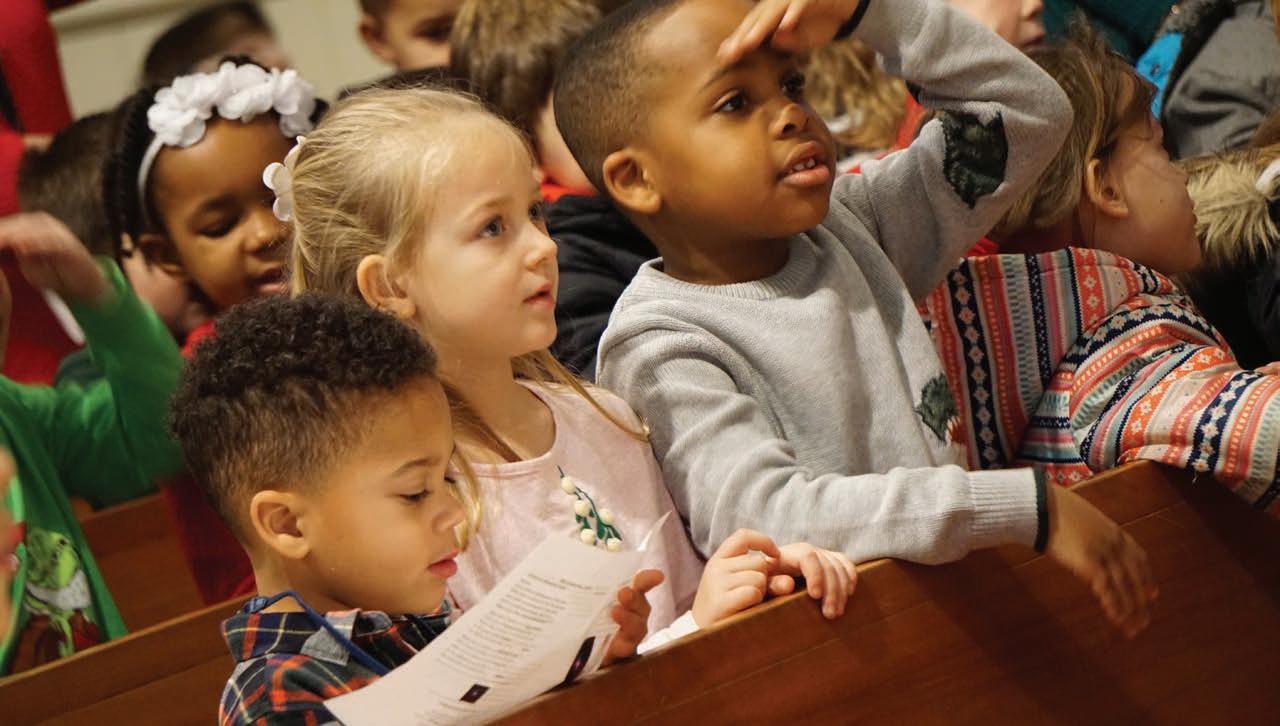
25
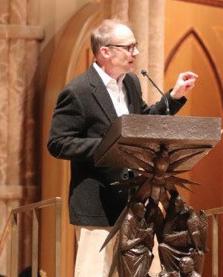
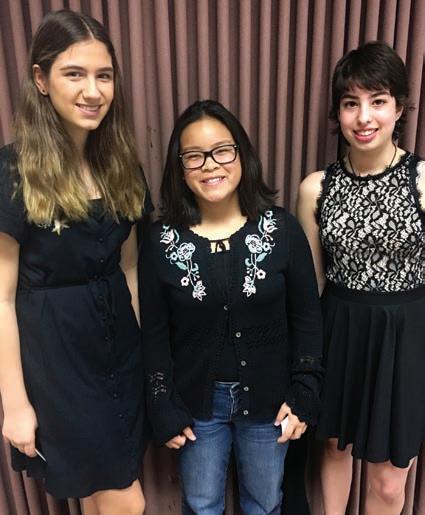
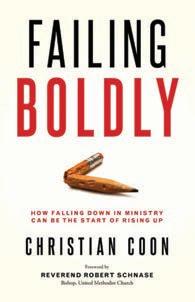
The following is an excerpt from Failing Boldly: How Falling Down in Ministry Can Be the Start of Rising Up, by Christian Coon.
Teenagers go through all kinds of rites of passage, and our daughter went through one not too long ago. This rite is particular to city-dwelling teens, but it was a momentous occasion nonetheless. Just before she turned fourteen, Caroline rode the subway by herself.
My wife and I had no idea if Caroline was the “right” age. As with most parenting decisions, there’s no Grand Manual that tells you when exactly your child is old enough to do any number of things, like going to the park by herself (seven or eight?) or going on a date (thirty-two seems about right). Some parents may think we waited too long, and others probably figure, “You let her do what?” But she seemed mature enough, and the thought of not having to fight traffic on Michigan Avenue to pick her up from school was appealing. So we asked if she was ready, and she took the question in stride and confidently answered yes.
She would only be traveling during the day and, especially for her first ride alone, she wouldn’t have to walk very far to get to the train station she needed, but, of course, we had to go through a list of things to be aware of. We made sure she knew how to use the fare-card reader. We quizzed her on which train line to take (“The Red Line”), which trains went north (“The ones going toward Howard”) and which ones went south (“To 95th”). The biggest thing we communicated (and we did this over and over again) was which station was her “home” station. Our kids have lived in the city for six years and have ridden the train numerous times, so they should know that “Roosevelt” is the right answer; the stop they get off on to go to our home. That didn’t stop us from testing Caroline:
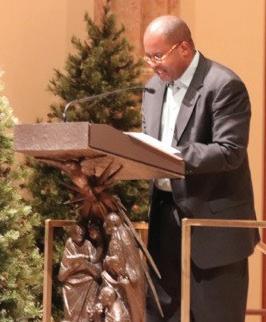
Me: “Which stop do you get off?”
Caroline: “Roosevelt, Dad.”
Me (two hours later): “Hey, Caroline, which stop is yours?”
Caroline: “Still Roosevelt.”
Me (one hour later): “Say, by the way—“
Caroline (with perhaps the slightest eye roll): “Roosevelt.”
We were satisfied that she knew this information deep in her core, that she would never forget it, that even if she happened to get on the train going the wrong way, she knew that Roosevelt was where she had to end up. Roosevelt was home. The first ride took place with no incidents, and she made it home safely, much to the relief of her mother and me.
There are certain truths and beliefs that all parents want ingrained in their children’s heads, and they will emphasize these things over and over (and over) until their kids know them deeply. Likewise, if you ask most people of faith what is the one thing that God wants them know—that explicit truth, that core belief—I hope they’d say this: God loves me. Young Christians learn the familiar song at an early age to help them remember this: Jesus loves me, this I know.
Here’s the problem, though, that I think many (including church leaders) struggle with. They can say that Jesus loves them, and they can communicate this truth to their congregations, but may not truly believe it themselves. Knowing this love, knowing that this love matters more than anything and that this love is the ultimate defining characteristic of you as a child of God is, I believe, the key to rebounding from and persevering through failure. Not knowing that Jesus loves you and not knowing it deeply makes it a lot more tempting to characterize yourself in other ways, including defining yourself by the success or failure of your ministry. n
Above: Christian Coon (left); Athena Borries (far right) with her classmates Demi Koudounis and Margo Cicero (center); and Douglas Thornton (right).
26
FAITH
DEBATE TEAM
FXW’s co-curricular offerings now include a Debate Team.
Ten 7th and 8th grade students are part of this year’s inaugural team, and they will compete in five tournaments throughout the course of the school year.
Participating in debate sharpens students’ ability to think and listen critically and to articulate their thoughts confidently and persuasively. The fun, competitive format of the tournaments also motivates participants to think quickly and helps to build their confidence under pressure. For example, in Policy Debate students use a set of core files to analyze evidence and craft arguments in favor of or against a proposed change in federal law. These critical thinking skills allow students to question the proposed legislation and offer alternative solutions.
The students had a very successful inaugural campaign, with all ten students earning recognition over the course of the season, including several Two-person Team Awards, Speaking Awards, a Sportsmanship Award, and Most Valuable Debater. Apart from the awards, though, the preparation and competitions were both beneficial and enjoyable. In summarizing the season, one debater displayed his persuasive ability by describing this first-ever group as “the most spectacular, greatest debate team FXW has ever had!”
“Debate was a super fun experience that boosted my confidence. I loved it!“
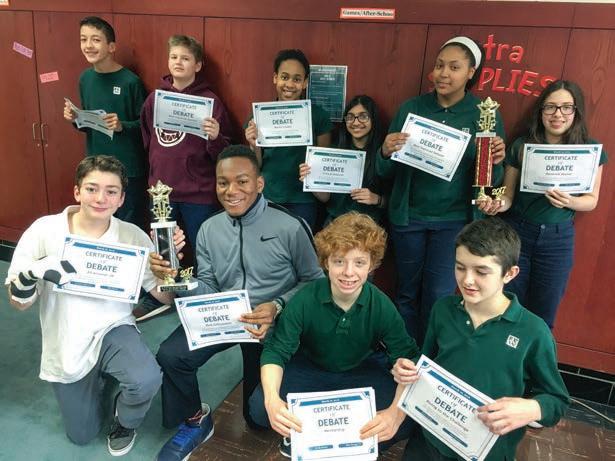
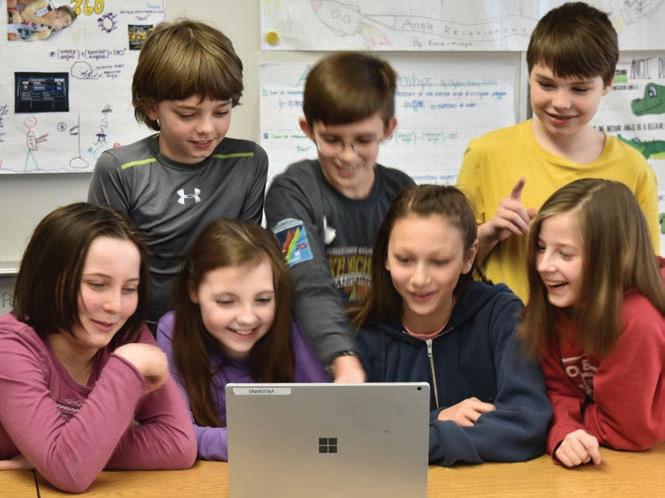
STUDENT PODCASTS
Did you know that FXW students are podcasting?
Each 6th grade ELA class has their own podcast channel with Language Arts-focused content. In addition, members of the production crew from the 8th grade play, Shrek The Musical JR. used the podcast medium to describe their preparations leading up to the show’s performance in January.
Students work in groups to produce each podcast and are responsible for each step in the process, from researching to writing and recording to editing. There are obvious benefits to integrating technology into the curriculum in new and novel ways, as well as gaining experience working collaboratively on a multi-step project. In describing the experience, several students also expressed excitement about being able to use more emotion to convey their ideas—“instead of just writing it down, we get to say it.” Music, sound effects, and other multimedia elements add yet another dimension and fuel the students’ creativity.
The students are also learning how to be more cognizant of their audience as they craft their messages, and are seeing (and hearing) first-hand many different ways to shape an interesting and informative report through the use of style, sequence, and details. Should the tone be serious or funny? Should the format be conversational or formal? Should the storytelling be linear or indirect? What is the best way to incorporate quotations and other concrete evidence? All of these decisions and more go into the creation of the end product.
Perhaps best of all, parents and friends can hear the students in action at any time and in any place. The podcasts are available at podcasts.fxw.org. All the students agreed: “We want more listeners!”
AROUND
27
CAMPUS
AROUND CAMPUS
RENOVATED AUDITORIUM AND CLUB ROOM
Anyone who has attended an event in the Auditorium or Club Room at our HNC campus during the last few years will have a special appreciation for the recently completed renovation of these spaces. Beautiful—and much-needed—updates include new seating, lighting, and sound systems as well as completely new décor.
The renovations were completed in time for a soft opening for the annual HNC Holiday Concert on December 21. Fr. Greg Sakowicz and other clergy from Holy Name Cathedral blessed the new spaces at the official ribbon-cutting ceremony on February 15, which was attended by members of the Board of Trustees and many others from our community.
The auditorium and club room are shared by The Frances Xavier Warde School and Holy Name Cathedral, and both quickly took advantage of the functionality and flexibility of the spaces. Among other things, the School has already hosted several student performances, as well as our newly launched FXW Speaker Series, in the renovated areas, and we look forward to many years of use and enjoyment by our students, parents, and staff.
Made possible by the generosity of donors, including contributors to the FXW 20th Anniversary Fund, the renovations were truly a communal effort. Envisioned by the School’s administration and Board, the work was brought to life through the talent and leadership of Amy Preston, Enrique Suarez, and Leonora Georgeoglou and our partnership with the Archdiocese of Chicago and Valenti Builders. HED, Henricksen, Pentegra, Schuler Shook, Shiner + Associates, Valor Technologies, and WMA Engineers also all played key roles in the renovations.

28
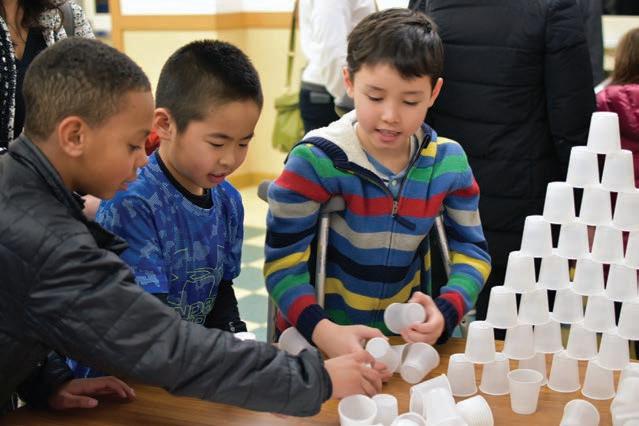
REDESIGNED CURRICULUM NIGHTS
We all know that students are not always the most forthcoming when asked how their school day was. (“Fine.”) To provide a more interactive look at their children in action, FXW offered parents a redesigned curriculum night this year during Catholic Schools Week. Students in 1st through 8th grades led their parents through the hallways and classrooms, showcasing projects and activities in all subject areas. Parents were given a map and question prompts upon arrival, and examples of student work, visual summaries of teaching strategies, and displays of learning materials and resources made the evening more active and dynamic.
The evening also included an informational presentation on the School’s in-depth review of our math curriculum, which is currently in its second year. Parents also learned more about the staff’s focus this year on our Charism of Faith and the professional development initiatives designed to increase our understanding of and appreciation for religious pluralism.
Parents enthusiastically welcomed the opportunity to engage with their children in classroom activities. “It was particularly powerful to hear our children show us and describe learning activities that they have done in school.” “The classroom activities and the opportunity to see what the kids are working on and to talk to the staff was really fantastic.” Not surprisingly, the students were the most excited of all: “The excitement in the building was unbelievable.” “So fun and inspiring for the kids.” “We loved seeing their passion.” “It’s clear how much they enjoy learning!”
AROUND CAMPUS
In Memoriam
Henry (Hank) Irving Thomas Jr., the husband of FXW Board of Trustees member Susan and father of alumni Kathlyn (Jaye) ’14 and Ryan ’17, passed away peacefully on January 27, 2018, after a hard-fought battle with a neuromuscular disease. In addition to Susan, Jaye, and Ryan, he is also survived by his daughter Hillary and his sister Sharon.
Henry grew up in a tight-knit, musical, and sports-oriented family on Chicago’s South Side. He was as a star basketball player, and as a 5'3" point guard Henry helped Harlan High School beat DuSable to win the Chicago City Championship in 1970. He went on to Bradley University on a full basketball scholarship and then attended DePaul University where he received his J.D. and LL.M in Taxation. While working at the law firm of Carney & Brothers, Ltd., Henry signed his first NBA client, Tim Hardaway. He later formed his own management company, and ultimately represented many NBA players, including Chris Bosh and Dwyane Wade.
More than an agent, Henry was also a mentor, advisor, and friend to his clients. Several spoke at his memorial service, not about their careers but rather how he made them better, more complete people. The FXW community remembers Henry the same way. His family always came first, but he had the rare ability to make everyone else feel like family also. Despite his hectic career, he pursued many other passions, including music, and dreamt of becoming an R&B DJ upon retiring. Most importantly, though, he always had time for all the people in his life, making all those whom he touched feel special and unique. In everything that he did, Henry showed that he truly cared about others, and it is that trait—much more than the success of his career—that made him so endearing to so many.
The Frances Xavier Warde School extends our heartfelt sympathies to all those in our community who have recently lost a loved one. May happy memories bring you comfort and peace, and know that we stand with you in love.
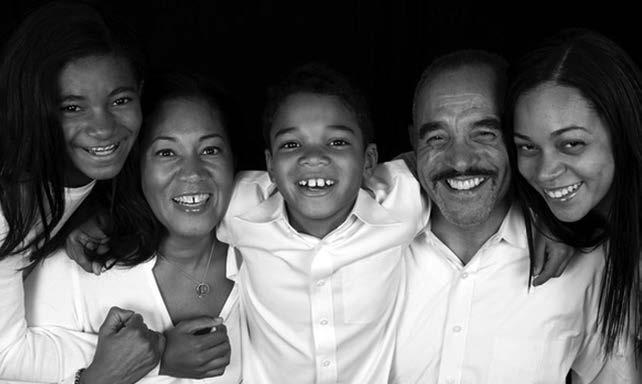
29
We love to hear what our alumni are doing! Please send any updates and photos that you would like to share to communications@fxw.org
1999
Amanda Rose Cichon Higareda has been an administrator and teacher in a school in Englewood for 10 years “It is where I work and serve. When I am not there, I am enjoying life at home. I have a beautiful and strong twoand-a-half-year-old daughter, Elise, with my husband of 10 years, Marcos.”
Katie White lives in Colorado Springs, Colorado. She teaches 4th grade at Colorado Springs Charter Academy, and also teaches yoga at Crunch Fitness.
2001
Ari Fulton worked as the costume designer for a film called Nigerian Prince, produced by Tribeca and AT&T. Ari managed a small team and travelled to Lagos three times to work on site. The film will open at the Tribeca Film Festival in April and, if all goes well, will be distributed more widely after that.

2003
Gian Thomas (G.T.) Wrobel lives in Seattle, where he works for Code.org. He writes curriculum for high school and middle school computer science courses and trains teachers throughout the United States on using the curriculum.
2004
Amanda Avalos lives in Milwaukee, where she works for The Center for Popular Democracy, a grassroots organization that addresses social issues like immigration rights, fair housing, and mass incarceration. She was recently appointed by the Milwaukee mayor to sit in on the Safety and Civic Commission, and has created a website called “Milwaukee Beautiful.”
Tiffanie Reschke sent us the following update: “I attended St. Ignatius College Prep and as a junior, I traveled to Uganda for the first time to help build a school. While attending DePaul University, I continued spending my summers in Uganda, and graduated in 2012 with my degree in Elementary Education. I wanted to be a teacher because of my 7th and 8th grade ELA/SS teachers at FXW. I currently teach 7th grade Social Justice on Chicago's southwest side at Tarkington School of Excellence. All of my creative talent and teacher craft was inspired by the love of learning FXW instilled in

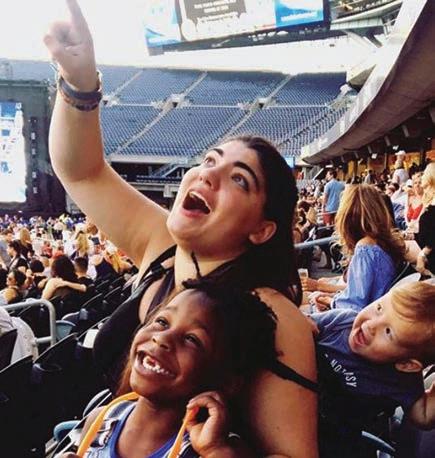
me. I think all of the humanitarian and activism initiatives I have taken on over the years—the list is quite extensive—also stem directly from my education at FXW. When I began teaching for Chicago Public Schools, I missed working with the young children in Uganda. I decided I'd try fostering while I built my roots here in Chicago. I've done so for the past three years and that is how I met my son. He has been with me since he was three-years-old and is now almost six. While he has lived with me permanently, I have still continued to foster many other children. And my son is just totally, totally amazing. He is the most resilient and caring young person I've ever known. People have commented that he has such a special aura, or magnetizing spirit to him—I think he could change the world one day!”

ALUMNI
Alumni Eva Tellez ’01 and PJ Jones ’03 spoke at Holy Name Cathedral last fall to support the Children at the Crossroads Foundation. Eva is a domestic violence social worker in the western suburbs; PJ helped to spearhead the first Alumni Council at FXW, and now coaches basketball at his high school alma mater, Fenwick.
30
Frank Lahey ’04 is working for his high school alma mater, St. Ignatius College Prep. He is pictured here with FXW alumna and current SICP student Marina D’Arco ’17 and FXW 8th grader Ania Yelvington.
2005
Kaitlyn Fruin writes: “I am a second-year medical student at Rush Medical College. This past summer, I worked with our community partners in Garfield Park, Little Village, Austin, North Lawndale, and Pilsen to create a campaign called the Tour de West Side to connect their neighborhood 5K walk/runs. The goal of the campaign was to leverage the 5Ks to positively market the cultural assets and businesses on the West Side that are invisible to many Chicagoans. If you are interested in getting to know Chicago's West Side neighborhoods or enjoying a fun walk or run, come join us this fall for the 2018 Tour de West Side!”
Jack Pegler is a Media Consultant for Cumulus Media in Los Angeles and works directly for the Los Angeles Kings. Cumulus Media also owns Westwood One, which has over 8,000 affiliates and 450 radio stations across the country. Jack’s job consists of consulting clients on media campaigns, and booking and working with some of the celebrities that are on Westwood One’s stations and assets in Los Angeles, as well as nationally.
Giovanni Wrobel works as a HUD underwriting analyst in the commercial finance group of Draper & Kramer in Chicago. He completed a Mortgage Bankers Association program in July 2017 that qualifies him as an underwriter for HUD-guaranteed loans on multi-family properties.
2006
After graduating from the University of Chicago, Giuliano Wrobel worked for Sprout Social as an intermediary between software engineers and help desk staff. He became increasingly interested in woodworking and began buying and refurbishing used power tools to assemble his own workshop. He now works for Chicago Fabrications, a woodworking/welding business on the west side of the city, that uses a great deal of reclaimed wood for specialty projects for commercial/retail businesses and residences, and also has his own woodworking shop that he uses for his own commissioned projects.
2007

Jackie Gawne is currently an Associate Producer at ABC's Daytime talk show The Chew. She has been with the show since starting as an intern while at Fordham University. In her spare time, she plays for an amateur soccer team, the New York Shamrocks, and is involved with the club’s service efforts in Queens.
2008
An update from Zoe Antoniou: “After FXW, I attended St. Ignatius College Prep, then Michigan State University, where I majored in human biology. I am currently in my second year of medical school at West Virginia University School of Medicine. I will take my first USMLE board exam in June and start clinical rotations in July. I am president of the Pediatric and Adolescent Interest Group and a member of the American Academy of Pediatrics. WVU is very involved in service and providing medical care to underserved areas. As part of our training, we complete a minimum of 100 service hours and complete a rotation in a rural area of West Virginia.”
Emma Fleming writes: “From FXW to Notre Dame to Dublin, I am now living in Manteca, California and working on my Masters in Education through the Alliance for Catholic Education (ACE) Teaching Fellowship Program run by the University of Notre Dame. I am currently teaching fourth grade, the grade I entered as a student at FXW. I am constantly encouraged and motivated by my experiences as an elementary student at Frances Xavier Warde. My memories of the road trip project, visiting Springfield, and engaging in active service projects within the community inspire the planning for my own students! Thank you, FXW, for instilling a deep love for Catholic education—one that started in Chicago as a student and has taken me to California as an educator.”
2015
Madeline Reese, a junior at Trinity High School, shared the following: “In December, I was honored to be selected as one of the recipients of this year's Cook County Sheriff's Commitment to Service Award. Throughout my years at FXW, I was active in my Girl Scout troop. Most people only think about cookies when they hear Girl Scouts; however, service was and still is a huge part of what makes our troop special. We were exposed to a variety of service projects and introduced to numerous organizations through which we shared our time. FXW was extremely supportive of all of our troop's endeavors and through its Living the Legacy program, I was able to expand my outreach to places like Big Shoulders, St. Teresa's, and Madonna House. Since graduating from FXW, the passion for service that was nurtured and developed there continues today. I am grateful to FXW for the many service opportunities it provided and for showing me all the ways in which I can positively impact others.”

31 ALUMNI
Madeline Reese with Cook County Sheriff Tom Dart.
ALUMNI
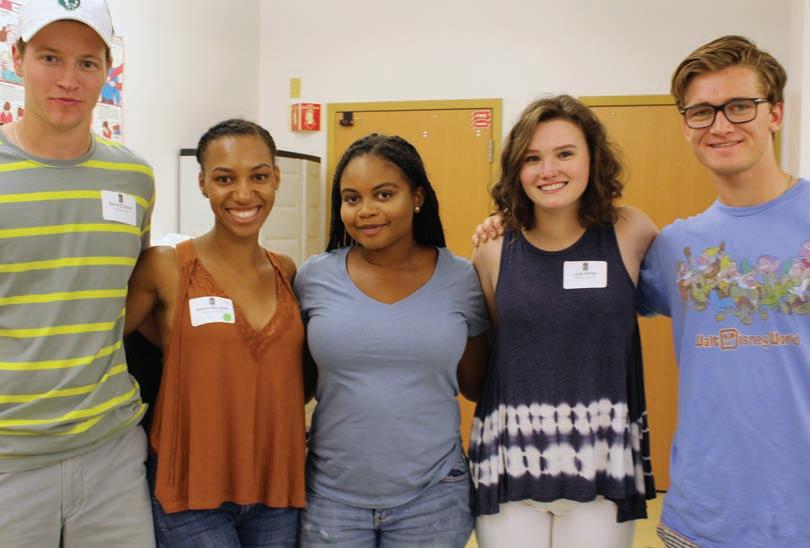


 Members of the Class of 2010 joined us for our Alumni Barbeque last summer; from left to right: Danny O’Connor, Monica Nia Jones, Bria Atkins, Lizzie Harney, and Collin Andrews
Members of the Class of 2010 joined us for our Alumni Barbeque last summer; from left to right: Danny O’Connor, Monica Nia Jones, Bria Atkins, Lizzie Harney, and Collin Andrews
32
Jaye Thomas ‘14 sports her Chicago Public School Volleyball City Championship medal for Jones College Prep High School.
Many former FXW basketball players and their families returned this winter to honor former FXW hoops coach Bob Chapman for his many years of service to the school.
Like much of the country, the FXW community cheered Loyola University Chicago’s run to the NCAA men’s basketball Final Four this year. We were particularly excited because alumnus Lucas Williamson ’13 (number 1 above) is a freshman guard on the team and a key contributor to the Ramblers’ success.


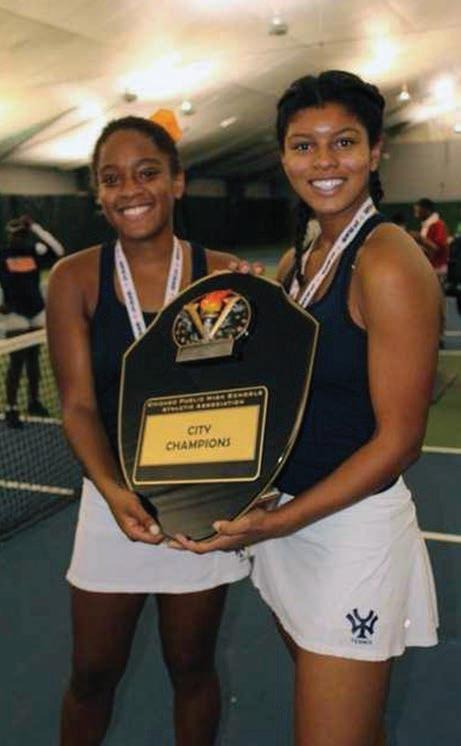
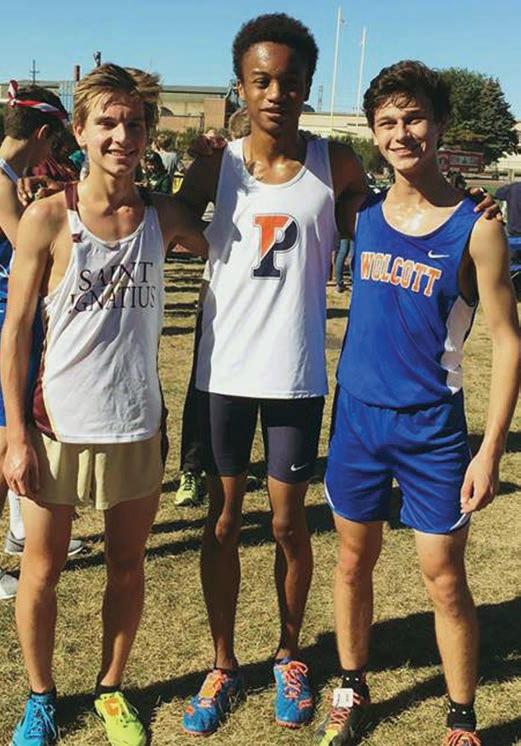
33 ALUMNI
Noah Jones ’15, a junior at Loyola Academy, recently had the honor of introducing Bryan Stevenson, author of Just Mercy, to his peers and their families at an event at Loyola. He is pictured here with Resource Teacher April Greer and Mr. Stevenson.
Class of 2014 alumni Trey Johnson, Matthew Marchbanks, and Luke Patrick reconnected at the Pat Savage Cross Country Invitational last fall.
FXW alumnae junior Lauren Williamson '15 and freshman Cyan Crayton '17 were members of the 2017 Whitney Young City Championship Tennis Team.
Frank Ruffolo ’07 (third from the left, with his father Frank, brother Mario '09, and mother Jeanine) and his family were honored by the South Loop Chamber of Commerce last fall for their work at Franco’s Ristorante. Frank began managing the family restaurant in 2016.
GALA 2018
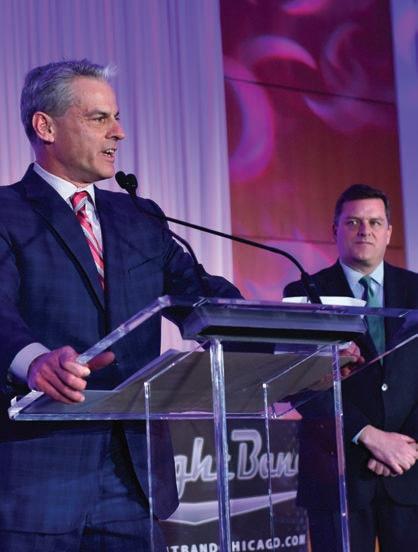

Oh,thePlaces They’ll Go!
Oh, The Places They’ll Go!
Gala 2018 was a tremendous success thanks to the efforts of event chairs Maura O’Meara, Marisa Doherty, and Ellen Rose, (pictured left to right, above) and the enthusiasm and generosity of all of our volunteers, sponsors, donors, bidders, and attendees. Thank you, everyone!
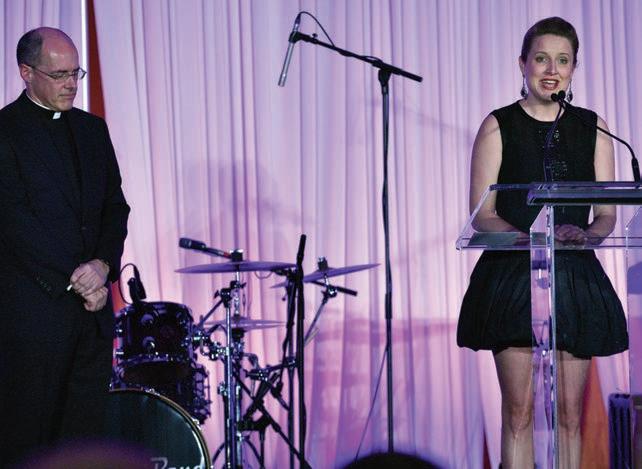

34
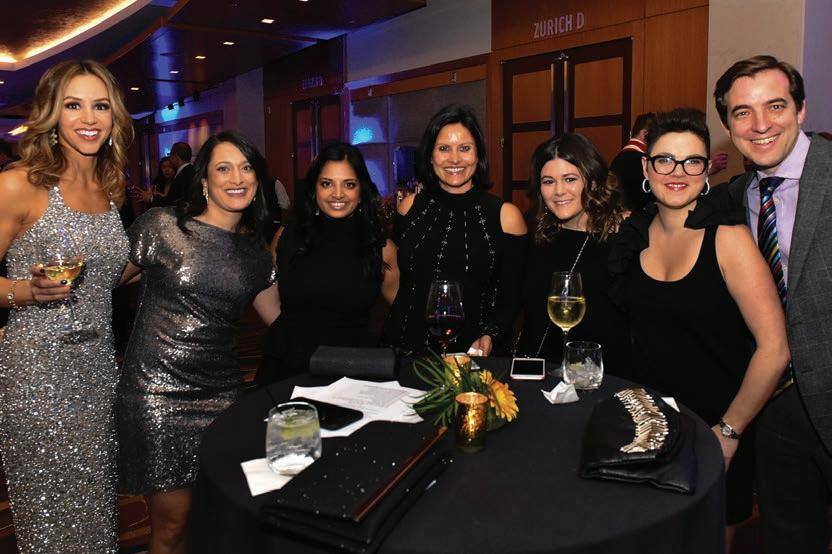

GALA 2018



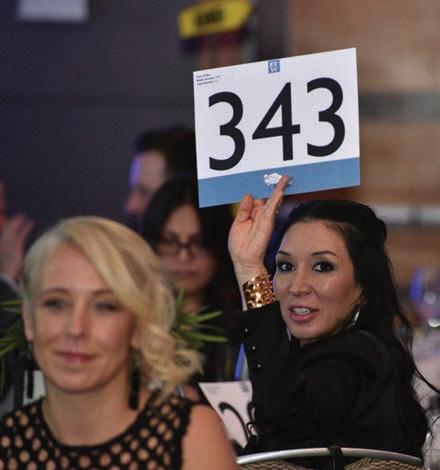
35
Holy Name Cathedral Campus
Old St. Patrick’s Campus 120 S. Desplaines St. Chicago, IL 60661 312-466-0700
fxw.org
SAVE THE DATE
May 11, 2018
Children at the Crossroads Foundation Scholarship Dinner At the Four Seasons Hotel Chicago
751 N. State St. Chicago, IL 60654 312-466-0700






 Michael Kennedy Head of School
Michael Kennedy Head of School




































 Members of the Class of 2010 joined us for our Alumni Barbeque last summer; from left to right: Danny O’Connor, Monica Nia Jones, Bria Atkins, Lizzie Harney, and Collin Andrews
Members of the Class of 2010 joined us for our Alumni Barbeque last summer; from left to right: Danny O’Connor, Monica Nia Jones, Bria Atkins, Lizzie Harney, and Collin Andrews













